OPPORTUNITY STARTS HERE



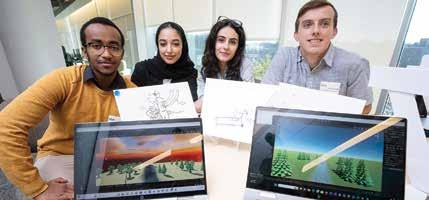

Homecoming 2024
Mason Nation packed EagleBank Arena on Saturday, January 27, to watch the men’s basketball team beat Rhode Island 92-84.






Mason Nation packed EagleBank Arena on Saturday, January 27, to watch the men’s basketball team beat Rhode Island 92-84.
about the cover
Opportunities abound for Mason students from prestigious internships and hands-on experience with state-of-the-art equipment and facilities to the resources to develop a product or business of their own. Learn more in this issue.
by Ron Aira and Evan Cantwell

This three-foot dinosaur tibia was discovered by Mason geology major Madison Mateo. Read the story about her find on page 6.
Scan the QR codes you’ll find throughout the magazine with your smartphone’s camera app for associated websites with more details.
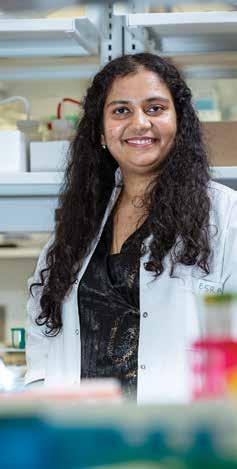

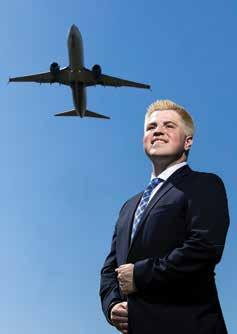
CAREER-READY, SET, GO Practicum, field placement, internship—no matter what you call it, work-based learning is a critical part of any student’s career preparation.
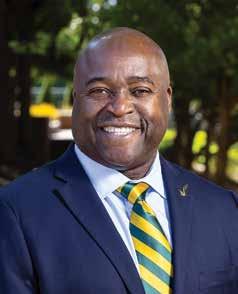
George Mason University campuses and partners work together to form the research, economic, and cultural footprint of Northern Virginia. This includes a new economic corridor along I-66, stretching from Mason Square in Arlington to the Fairfax Campus and to the Science and Technology Campus in Manassas.
And the connective tissue among all of them is George Mason University. Partnerships with industry, governments, and communities are what will fuel Mason’s— and the region’s—continued emergence.
The greatest public–private partnership in the university’s history is taking shape at Mason Square. Fuse at Mason Square will be the 345,000-square-foot home to research and development labs, corporate innovation labs, incubators, accelerators, and co-working facilities, with the cyber infrastructure needed to advance the digital innovation goals of the university, industry, and community.
As I discussed at a recent event that envisioned the future of Arlington, universities are being disrupted and transformed, and now is the greatest opportunity for massive change and innovation in 50 years. Fuse at Mason Square will be at the forefront of that movement.
In Fairfax, working with partners from throughout the region, we have the opportunity to expand and reimagine the western side of campus, across Route 123, where some 192 acres of undeveloped land could be home to modern athletic facilities, faculty and staff housing, and retail options to serve the university and greater community, while also generating new funding for the university. We have engaged state, Fairfax County, and Fairfax City officials, community organizations and nonprofits, professional and athletic partners, and various affiliates within the university.
This year on the SciTech Campus, we will complete the Life Sciences and Engineering Building to serve our students in science, technology, engineering, mathematics, and health majors. The Biomedical Research Lab at SciTech is one of 13 biosafety level-3 labs in the nation. SciTech also is home to the new outdoor Forensic Science Research and Training Laboratory—better known as one of only eight “body farms” of its type in the country.
Much of Mason’s research takes place on the SciTech Campus. The university has more than 100 unique industry partners (including 13 Fortune 500 companies) and more than 230 unique university partners, an indication of how Mason actively engages leaders in the scientific and corporate communities.
Mason’s Nanofabrication Facility, also at SciTech, is Northern Virginia’s only cleanroom facility accessible for workforce training and research and development by faculty, staff, students, and external partners. We’re also working with our partners—Prince William County, Castlerock LLC, and Stanley Martin Homes—to create a vibrant town center adjacent to the SciTech Campus, which will create a welcoming environment for the campus and community to grow and prosper.
As you can see, the university catalyzes our region like no other entity. Whether it’s the I-66 corridor or any other avenue of progress in Northern Virginia, all roads lead through Mason.
Gregory Washington President, George Mason University
A MAGAZINE FOR THE GEORGE MASON UNIVERSITY COMMUNITY
spirit.gmu.edu
MANAGING
EDITOR
Colleen Kearney Rich, MFA ’95
ART DIRECTOR
Joan Dall’Acqua
ASSOCIATE EDITORS
Melanie Balog
Priyanka Champaneri, BA ’05, MFA ’10
Anne Reynolds
EDITORIAL ASSISTANT
Katarina Benson
CONTRIBUTORS
Maha Aamir
Shayla Brown
Damian Cristodero
Mary Cunningham
Sarah Holland
John Hollis
Nathan Kahl
Benjamin Kessler
Rebecca Kobayashi Seihoon Lee
Amanda Milewski
Melanie O’Brien
Lauren Clark Reuscher, MA ‘12
Corey Jenkins Schaut, MPA ’07
Preston Williams
GRAPHIC DESIGN
Claire Brandt
Jeeun Lee Namgoong
Michaela Reilly, BA ‘21
Azriel Towner, BFA ‘19
PHOTOGRAPHY AND MULTIMEDIA
Ron Aira
Melissa Cannarozzi, MA ‘22
Evan Cantwell, MA ’10
Ayman Rashid
Cristian Torres
PRODUCTION MANAGER
Brian Edlinski
EDITORIAL BOARD
Stephanie Aaronson, BA ‘94
Deputy Vice President for Communications and Mason Media
Paul G. Allvin
Vice President for University Branding and Chief Brand Officer
Trishana E. Bowden
Vice President for Advancement and Alumni Relations
Robin Rose Parker
Assistant Vice President for Communications
Jennifer W. Robinson, JM ‘02
Associate Vice President for Alumni Relations
Mason Spirit is published three times a year by the Office of Advancement and Alumni Relations and the Office of University Branding. George Mason University is an equal opportunity employer that encourages diversity.
Dear Greg,
I just had the opportunity to read the latest issue of the Mason Spirit magazine and wanted to congratulate you on the wonderful leadership you are providing a very important and unique American institution. I am immensely proud of you and all of your achievements. Best wishes to you and your family.
E. Gordon Gee
President, West Virginia University
Neha (Agnihotri) Pania , BA International Studies and Communication ’94, was on campus for the Ahmed dedication (see page 43) when she spotted herself in the Past, Present, Future: Mason’s Core Remains Constant exhibit in Horizon Hall. The photo shows her performing during International Week 1994.


Letters to the editor are welcomed. Send correspondence to Colleen Kearney Rich, Managing Editor, Mason Spirit, 4400 University Drive, MS 2F7, Fairfax, Virginia 22030.
Or send an email to spirit@gmu.edu
Need to change your address or update contact information with us? Or prefer not to receive the magazine in the mail any longer? Just let us know via email at development@gmu.edu
George Mason University’s Alumni Association hosts events for the Mason Nation throughout the year, creating innovative and memorable experiences for the entire university community.
Check out the QR code for a complete list of upcoming events.

Keep updated on what’s going on

In his research on freshwater systems in the Washington, D.C., area, Mason ecologist R. Christian Jones was spending much of his time hauling boats. Too much, he thought.
“In order to take a sample from a pond,” he says, “I would need to haul a boat [there], put the equipment in, launch it, and then bring it all back. It would add at least an hour and required the body of water to have an access point for a boat.”
As the director of the College of Science’s Potomac Environmental Research and Education Center (PEREC), which is housed at the Potomac Science Center (PSC), Jones knew of a colleague who could
help with this conundrum. He approached College of Engineering and Computing professor Leigh McCue and undergraduate student Ze Li with an idea: a machine that could go out on the pond to skim for and collect plankton and water samples and return to shore—all while the researcher remains on land.
This transdisciplinary project is part of a larger grant from the National Science Foundation for Persistent and Accessible Maritime Monitoring, of which McCue is the lead investigator. The multiyear grant— more than $500,000 was awarded in 2022—focuses on increasing educational, research, and robotics operations and development for students ranging from sixth grade to graduate level. The goal is to
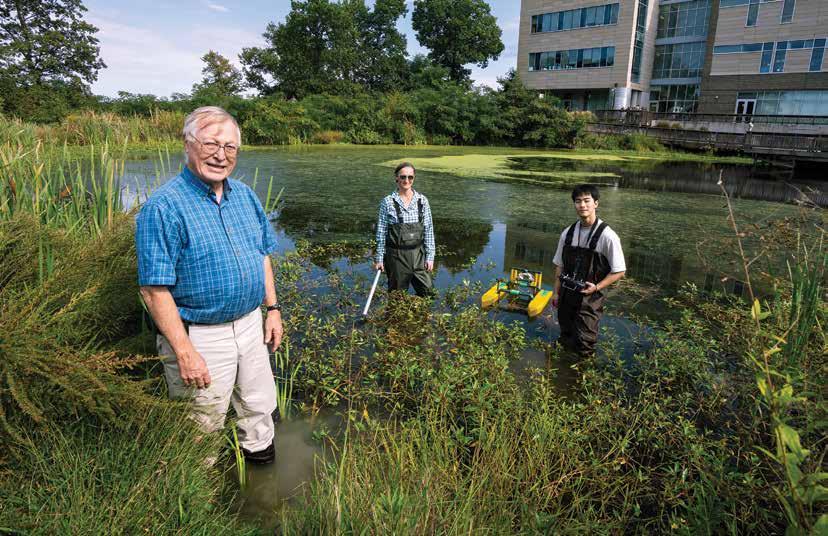
improve the applications of and expand the use of unmanned marine vehicles, which also includes making such vehicles more accessible for individuals with motion limitations, increasing accessibility for all researchers as a result.
“Researchers around the globe are utilizing robotics to conduct maritime research, which is an increasingly critical field of study,” says McCue. “Through this grant, we’re developing more affordable maritime research tools to improve access for great science, whether citizen science or research-grade science. This project fits nicely into that mission.”
The autonomous surface vessel constructed by Li used a publicly available 3D printable remote control trash collecting boat as a starting point, and built upon it to allow for water sampling and midpond plankton sampling.
“We thought it was more beneficial to create something new by developing our design around an open-source hull model,” Li said. “There’s more opportunity for us to iterate on the prototype.”
The team hopes to continue to improve that design now that it’s being field tested by Jones. Li also sees a potential for expanded testing of such data points as water temperature, turbidity, and salinity.
Jones predicts that this machine will be a boon for both access and efficiency. “The number of accessible ponds will increase dramatically with this, and we’ll be able to sample up to eight in a day instead of just one or two.”
The machine will also allow for more immediate responses to sudden, unpredictable, and timesensitive events, like taking samples immediately after storms. Jones even sees possible uses for this machine to take samples during major pollution events, keeping the researchers safe from exposure to harmful chemicals while still acquiring necessary data.
The collaboration is just one example of the cross-exchange of knowledge and ideas that flourishes at Mason. “At a place like PSC where we’re all working together, seeing each other’s labs and hearing about research, this sort of collaboration comes naturally,” Jones says. “It’s a beautiful opportunity for us all to become better researchers and do better science.”
—Sarah Holland
Mason researchers R. Christian Jones (left) and Leigh McCue with student Ze Li at the Potomac Science Center.

Madison Mateo’s family jokes that her passion for paleontology is a dinosaur phase she never outgrew. Now, Mateo has made headlines with the excavation of one of the largest therapod fossils in eastern America.
Mateo, a Mason geology major with a concentration in paleontology, is a long-time dig site volunteer, starting with geological survey sites in North Dakota when she was in 10th grade. She’s been a regular volunteer at Maryland-National Capital Park and Planning Commission (M-NCPPC) Dinosaur Park in Laurel, Maryland, since 2021.
“The park is a cool place to talk about what I love— dinosaurs and fossils—while applying what I’m learning in my major,” Mateo says. “Seeing fossils every day, no matter how big or small, and talking to people about them is fun for me.”
M-NCPPC Dinosaur Park is known for both its density and diversity of fossils, making it one of the premier bone beds east of the Mississippi. The park is open to the public twice a month, during which volunteers like Mateo can help discover new fossils through surface collection techniques.
Over the summer, Mateo and fellow volunteer Federico Alvarez Hazer made the groundbreaking fossil find during a routine dig and did all the initial work to uncover the bone.
Park paleontologist JP Hodnett suspects the fossil to be a 3-foot-long tibia of an Acrocanthosaurus, the largest theropod of the Early Cretaceous period and the largest predatory dinosaur in North America until the evolution of the Tyrannosaurus rex. It is the first major find at the park since the 19th century and the first bone of this species to be discovered in the area. Since the tibia’s discovery, park paleontologists have also uncovered vertebrae of armored dinosaurs and the remains of a long-necked sauropod.
“We’ve doubled what we knew about the geological and ecological history of this area in just a few months,” says Hodnett. “This tells a completely different story about dinosaurs in North America than what we originally hypothesized. It’s a huge find.”
Mateo’s work at the M-NCPPC Dinosaur Park has opened doors for her around the country, including an invitation to participate in a paleontological resource inventory in Yellowstone and Grand Teton national parks with Hodnett and a team of paleontologists. While participating in such critical handson experience, Mateo applies what she’s learning in her Mason classes, from dig techniques to fossil identification.
“Mason’s paleontology program is special in that it’s rare to find an institution that offers degrees in paleontology at both undergraduate and graduate levels,” says Mark Uhen, professor of geology and chair of the Department of Atmospheric, Oceanic, and Earth Sciences. “Our students have great success in finding internships as well, including with the U.S. Geological Survey and the Smithsonian.”
“I get excited for any find, even teeth fragments,” Mateo says, “but being part of a massive find like this was just really cool.”
—Sarah

George Mason University and Fairfax City have partnered to extend the walls of the classroom into the local business community, giving students access to experiential learning opportunities that will benefit local businesses across several industries while promoting the city’s economic growth. Several projects are slated to launch this spring:
• Students are participating in a vendor management experience led by Mason’s Center for Innovation and Entrepreneurship that pairs them with retailers in the Old Town Fairfax Business Association/Fairfax City Economic Development “Wander In” retail incubator.
• Students are determining best-use options of commercial real estate sites in the Northfax Small Area Plan and other areas of Fairfax City via a Center for Real Estate Entrepreneurship site plan analysis.
• Through the Center for Retail Transformation, students are gaining in-store retail management experience with partnering Fairfax City retailers.
• A study by students from the Greg and Camille Baroni Center for Government Contracting, in coordination with the Mason Enterprise Center, is identifying ways to improve business outcomes for small business federal contractors.
“Our collaboration with the Costello College of Business is about investing in our future and being open to change and innovation,” says Fairfax mayor and Mason alum Catherine Read, BA Government and Politics ’84. “By welcoming Mason students and faculty into our business community, we’re bringing fresh faces and new ideas to city planning in support of our vision for a vibrant commercial district.”
“The Costello College of Business emphasizes student experience and career readiness via public, private, and academic partnerships,” says Dean Ajay Vinzé. “This partnership is an exciting opportunity for us to invest in the growth and economic development of this wonderful city, while providing our students with a hands-on learning experience that will prepare them for successful careers.”

CACI International is once again supporting Mason students through a $200,000 gift to establish the CACI Scholars Program. The program helps selected scholars secure science, technology, engineering, or mathematics-related positions upon graduation.
The company has previously been a generous sponsor of Mason’s College of Engineering and Computing and welcomes many Mason students as interns each year. CACI also employs hundreds of Mason graduates.
The CACI Scholars Program, which kicked off in fall 2023, supports 10 Mason students who are alumni of Mason’s Early Identification Program (EIP) and pursuing degrees in computer science, electrical engineering, or mechanical engineering. These scholars are identified by EIP in their senior year of high school and are welcomed into a cohort designed to support their long-term academic and career success.
Each CACI Scholar receives an annual scholarship to reduce the cost of tuition and related fees if the full need is not met through the student’s financial aid package or through a Mason Virginia Promise Grant. Scholars also receive a stipend to assist with the cost of at least one career-readiness practice, such as attending a conference or completing a certification.
Scholars also work with dedicated success coaches and peer mentors at Mason, who provide tailored support for first-generation student success. Each scholar is connected with a CACI mentor who can provide firsthand knowledge of the industry and company. The scholars are also eligible for a paid internship experience at CACI.
CACI’s chief technology officer Glenn Kurowski understands the importance of widening the pipeline for skilled technology workers. “Experiential learning is the key to developing passion and engagement around your area of study—and that leads to a highly successful career,” says Kurowski. “I love working with students on their technical learning path and love getting others in our company engaged with the next generation of talent.”
Mason students in particular are well suited to fill that need for talent. “A partnership like this truly complements the students’ educational experience,” says EIP director Khaseem Davis, PhD Education ’23. “Our EIP students have worked hard to get to this point, to enrolling at Mason. This opportunity to work with CACI helps them to imagine what’s possible on the other side of their university experience.”
Since 1987, EIP has provided academic enrichment, personal and social development, civic engagement, and leadership training opportunities to middle and high school students who will be the first in their families to attend college. In one of the most successful demonstrations of Mason’s commitment to access, the university partners with seven public school districts in Virginia and works with more than 750 students in grades 8 to 12 and their families, taking a holistic approach to successfully navigate the path to postsecondary education.
—Anne Reynolds
Mason’s Donald G. Costello College of Business (CCB) officially launched on November 1, 2023. Much has changed in the college since its humble beginnings in 1977 as the Department of Business Administration offering classes on the university’s North Campus. Let’s take a look.
BACHELOR OF SCIENCE CONCENTRATIONS
in accounting, business analytics, finance, financial planning and wealth management, management, management information systems, marketing, and operations and supply chain management
MINORS
5,561 122 82 36K
GRADUATE DEGREE PROGRAMS including a PhD
CERTIFICATE PROGRAMS
4 CENTERS ONE OF THE LARGEST BUSINESS SCHOOLS
Greg and Camille Baroni Center for Government Contracting
Center for Innovation and Entrepreneurship
Center for Real Estate Entrepreneurship
Center for Retail Transformation
600+
engage with students through industry panels, networking events, and career and internship fairs
1,600
participate in on-campus interviews with employers each year
OF STUDENTS participated in at least one experiential learning opportunity last year
1 IN 4 MASON UNDERGRADUATES TAKE A BUSINESS COURSE
OF CCB ALUMNI live and work within a 50-mile radius of Fairfax
left, Keith Renshaw, Fairfax mayor Catherine Read, center director Robyn Mehlenbeck, and College of Humanities and Social Sciences dean Ann Ardis.
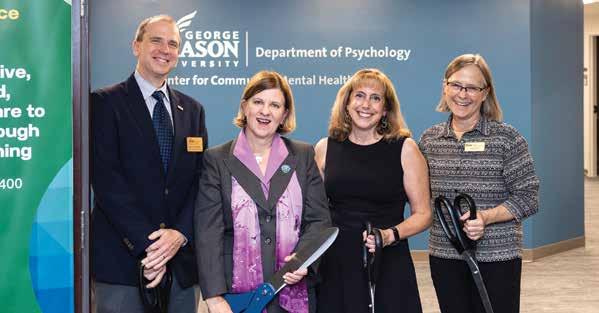
In an effort to meet the health care needs of the region, Mason has opened a new behavioral health facility in the City of Fairfax, which is optimally located to enable easy access to critical mental health services while also providing space to train the next generation of behavioral health providers.
The facility is home to two centers: the Center for Community Mental Health and the Center for Evidence-Based Behavioral Health.
The Center for Community Mental Health serves as the main training clinic for Mason doctoral candidates in clinical psychology, as well as students in other behavioral health disciplines such as counseling and social work. And true to Mason’s longstanding commitment to inclusivity and creating solutions with a real-world impact, the center provides affordable therapy and testing services to those in need, regardless of income. It is one of the only sites in the mid-Atlantic to offer therapies and testing on a sliding scale, which enables access to care for as low as $5 per session.
“We firmly believe that mental health services should be available to everyone, regardless of ability to pay,” says Robyn Mehlenbeck, the center’s director. “We also believe you should receive help when you need it and not be told you’ll need to wait three or four months.”
Last year, the Center for Community Mental Health provided more than 2,100 therapy sessions, completed 118 evaluations and more than 315 evaluation sessions,
and helped train 77 undergraduates and 57 graduate students. The center is unique in its dual function as both a working clinic and a training facility.
Mason’s Center for Evidence-Based Behavioral Health (CEBBH) is committed to decreasing barriers to accessing high-quality mental health care. Serving as a bridge between research on the best therapies and real-life applications, the center offers training and consultations to the community’s behavioral health workforce. During the last year alone, it has trained approximately 430 clinicians and clinical supervisors, who represent eight local organizations and 38 private behavioral health organizations.
“The center brings together Mason faculty with different areas of expertise to partner with and train behavioral health providers in research-based therapies,” says Christy Esposito-Smythers, CEBBH director. “This helps our current workforce address gaps in training, learn new treatment techniques, and further enhance their ability to effectively treat clients with a variety of behavioral health concerns.”
“[Addressing] mental health and behavioral health [is] health care. We need to change the conversation to remove both the stigma and the barriers to these critical services,” says City of Fairfax mayor Catherine Read, BS Government and Politics ’84. “Fairfax City is the beneficiary of this groundbreaking effort.”
—Melanie O’Brien

Last fall, Mason students could be seen running around the campuses taking pictures of flora, fauna, and fungi with their smartphones—sometimes in the dark—to capture the university’s biodiversity. They were trying to record as many species as possible with a focus on identifying endangered species. It was all part of Bioblitz 2023, an assessment project that began during Sustainability Month in October. For the project, Mason used the iNaturalist app, which helps streamline the documenting process and even drops a pin to mark a discovery on a campus map. During the project, more than 900 observations were made by 86 observers who documented more than 400 species.
“What’s great about the iNaturalist app is you post a photo, and it suggests identifications,” says Doni Nolan, BA Biology ’14, Greenhouse and Gardens Program manager in the University Sustainability office, who led the project. “Then [the app] also has folks confirm the identification to make it research-grade level.”
Bioblitz is yet another way Mason is using its campuses as a Living Lab. Environmental and sustainability studies majors Eden Anderson and Sarah Jadlowski joined Nolan on the project.
A huge fan of fungi, Anderson first started documenting mushroom species on campus for EVPP 408 Mushrooms, Molds, and Society, an environmental science and policy class she took a few semesters ago.
“It’s been a really good mushroom season,” says Anderson, referring to the area’s October rainfall. In the days after a rain, Anderson took “mushroom walks”
around the Fairfax Campus to see what fungi may have popped up.
Anderson says her most unusual Bioblitz observation was jack-o-lantern mushrooms (Omphalotus olearius), which are bioluminescent—with gills that glow green in the dark—and very poisonous.
Meanwhile, Jadlowski did a moth survey of the Fairfax Campus as a project for her EVPP 480 Sustainability in Action class. She attempted to lure moths out for a photo in a variety of ways, including soaking a sheet in a diluted wine solution and hanging it near Mason Pond with the hopes of documenting a moth “party.”
Her survey is an attempt to see which parts of campus moths prefer, with a longer-term goal of building a moth garden. Jadlowski says campus bats, which are vulnerable pollinators, will be the ultimate beneficiaries of any garden, as they consume moths and other insects for their diets. Of the 17 bat species that have been recorded in Virginia, six are endangered, according to the Virginia Department of Wildlife Resources, with two of those species predicted to live in habitats near the Fairfax Campus.
“We found monarch butterfly caterpillars on campus in several locations. Every year we have several patches in our [Mason] gardens protected for them with the milkweed they prefer to eat,” says Nolan. “It was a focus [of Bioblitz] to identify endangered and vulnerable species and how the campus promotes those. So that was a big win for us.”
—Colleen Kearney Rich, MFA ’95
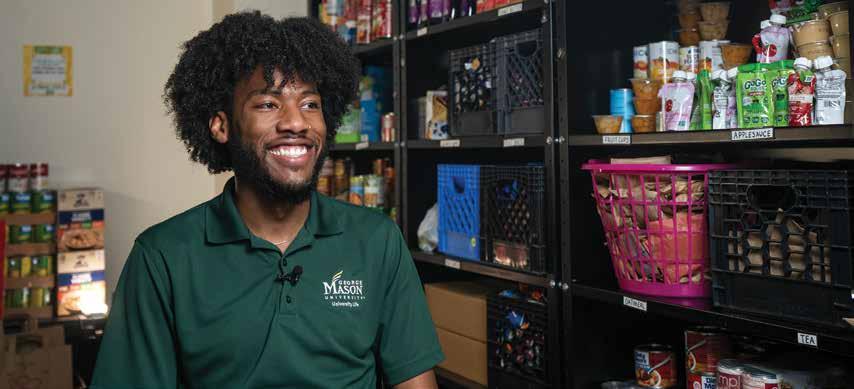
Duane Hamilton Jr., assistant director for basic needs at Mason’s Student Support and Advocacy Center, manages the Patriot Pantry.
Mason’s Patriot Pantry, in cooperation with the Capital Area Food Bank (CAFB), is delivering groceries to food-insecure Mason students and their families.
“We started from a place of understanding that students have a lot of demands being put on their time and on their resources and began with the simple premise that addressing food needs would increase their success rates,” says Sabrina Tadele, director of strategic initiatives at CAFB, a hunger relief organization that works with community partners throughout the Washington, D.C., region.
The food bank delivers shelf-stable groceries and fresh produce to Mason, which, in cooperation with DoorDash, are then delivered to students’ homes within a 15-mile radius of the Fairfax Campus.
“[DoorDash] has been very, very generous with nonprofits, including the whole national network of food banks,” says Tadele.
The Patriot Pantry was the focus of Mason Vision Day 2023, a day of philanthropy for the Mason community. Funds raised helped to secure student meal vouchers for on-campus dining, provide gift cards for local grocery stores, and supply the Patriot Pantry, which is operated by Mason’s Student Support and Advocacy Center.
As part of Mason Vision Day, the food bank matched $30,000 of the funds raised in the form of credits in its online ordering portal, expanding access to a greater variety of foods.
“Food insecurity is often an experience compounded by other forms of basic need insecurity, such as financial instability and unstable transportation,” says Dwayne Hamilton Jr., assistant director for basic needs at the Student Support and Advocacy Center. “The Home Delivery Program promotes consistent and healthy food intake while addressing financial and transportation barriers that impact access. Confronting these obstacles enables students to devote their full attention to their academics.”
Mason staff fill orders and arrange for food delivery to students. CAFB conducts surveys with students at the beginning and end of each semester to measure the degree of each student’s food insecurity, as well as students’ subjective measures of well-being: physical health, mental health, and the ability to focus in class.
Mason will provide academic data with anonymized identifiers, including information on students’ enrollment, time to graduation, and attrition and retention.
“We have to be able to understand whether [the program] works or not,” says Tadele.
“One of our broader goals with these partnerships is to give students the support they need to finish their programs and then earn living-wage jobs and be able to contribute to our local economy. It’s a cyclical effect,” says Grace Brown, CAFB strategic initiatives manager.
—Anne Reynolds
Mason is following a philanthropic tradition, designating the first Thursday of April for donors to come together to support the university. On April 4, 2024, Mason Vision Day celebrates the power of making a difference through philanthropy.
This year, each school, college, and unit is urging its community to lean into the programs that reflect Mason’s strategic plan and the interests of donors.
“This is an opportunity for our community members to support what matters most to them at Mason,” says Zavin Smith, BA Integrative Studies ’00, CERB Leadership Studies ’02, MA Telecommunications ’03, director of development for annual giving strategic initiatives. “We want to combine the energy of all of our units and programs on campus and present to our donors a catalog where they can choose the causes that resonate with their own priorities, from
athletics to the arts, from science and the humanities to health and law.”
While Mason Vision Day is largely carried out through digital communication and direct mail, Smith says this year’s event is “a hybrid model.” On the Fairfax Campus and at Mason Korea, pop-up kiosks and drop-by experiences offer gratitude stations, giveaways, and social media engagement areas as a visual display of giving and the event includes digital interaction driven by the schools and units.
“Vision Day features challenges and matches throughout the day,” says Smith. “It’s going to be an exciting opportunity for our friends to see their gifts go even further toward supporting the causes they love.”
—Anne Reynolds

THERE IS STILL TIME TO GIVE
POINT OF PRIDE
Mason’s Jimmy and Rosalynn Carter School for Peace and Conflict Resolution is ranked No. 1 nationally among public institutions for its overall performance, and No. 1 among all institutions for its online offerings, according to a new report by Authority.org.

This past fall, a select group of Northern Virginia high school seniors received a surprise in their email: admission letters welcoming them to the Mason Nation. The new direct admission program, designed with Mason’s commitment to access and inclusivity in mind, directly reaches out to students who are academically eligible but may be experiencing challenges in pursuing higher education.
More than 1,100 eligible students—those with a 3.25 GPA or higher—from eight Northern Virginia high schools in Fairfax County, Alexandria, Manassas, and Manassas Park were emailed admission eligibility offers directly from Mason. The offers waived the usual requirements for application fees, teacher recommendations, and essays.
This is not Mason’s first foray into direct admissions. The university first offered direct admission through the Common App Direct Admissions Program in January 2022 to 2,000 students nationwide. Of those offers, 232 students accepted and applied for fall 2022, 39 students submitted deposits, and 32 enrolled. Fifty-nine percent of those students were from underrepresented populations, 37 percent were first generation, and 20 percent were residents of rural communities. Their collective GPA was 3.65. The top five majors for those students were com-
puter science, engineering, biology, cyber security engineering, and neuroscience.
“Mason’s long-standing commitment to achieve inclusive excellence has paved the way for more students to consider and enter college,” says David Burge, Mason’s vice president for enrollment management. “While colleges around the country are just starting their direct admissions programs to counter declining enrollments, Mason historically has eliminated barriers to higher education through partnerships and several pathway programs, like our multifaceted approach to direct admissions.”
Direct admission is one of many programs that Mason has in place to engage potential students, along with the Early Identification Program, local partnerships with K-12 schools, and the ADVANCE partnership with Northern Virginia Community College. ADVANCE had another record-breaking enrollment period, with 938 new students, a 5 percent increase from last year. Mason also has entered into transfer partnerships with Germanna, Tidewater, and Piedmont Virginia community colleges through the Mason Virginia Promise.
—Preston

Mason’s capital program director Cathy Pinskey has watched Mason’s square footage grow a lot over the years—by the millions. When she started at Mason in 2004 as the director of space management, the university had about 3 million square feet across its locations. Today, the university occupies more than 9 million square feet.
After creating systems for managing and tracking space at Mason, Pinskey worked in campus planning. She moved to her current role as capital program director with Mason Facilities in 2016. Pinskey has overseen the university’s largest and most complicated capital projects to date, including the Core Campus Project from 2016 to 2022, which revitalized the heart of the Fairfax Campus. Today, her main focus is Fuse at Mason Square, currently under construction.
From Design to Completion: An architect by training, Pinskey enjoys working at Mason because she has a chance to see a project from beginning to end. “When I worked in private practice as an architect, I would only really see projects through the design and construction phases,” she says. At Mason, she can see how the projects age and are utilized over time.
Building for Everyone: Creating buildings for the largest public research university in Virginia comes with its challenges. “The sheer number of interested stakeholders—students, faculty, administration, staff, alumni, and the community of users outside the institution—all are highly invested in Mason’s success,” Pinskey says. It takes careful planning to determine the final scope of the
project and stay on schedule. “It’s a bit of science and engineering and a bit of art to make it all work most effectively and efficiently.”
Fuse at Mason Square as a Frontier: “This project is very different than all of the other projects I have managed at Mason in that it is a public–private partnership,” Pinskey says. Developed with Mason Innovation Partners, Fuse at Mason Square (pictured above) will support digital innovation, active learning, research, business entrepreneurs, and tech incubators alongside educators and policymakers in Arlington.
A Strong Role Model: Pinskey knew she wanted to be an architect ever since she took an industrial arts class in seventh grade, but when it came time to go to college, she was very shy and afraid to leave home. She says her mom encouraged her to follow her dreams. “She was progressive for her time—I found letters in her personal files where she [asked] to be paid fairly for the work she was doing, a job that her male counterparts were paid more highly for at the time. She really was an inspiration to me.”
Giving Back: Pinskey loves seeing the results of her work on Mason’s campuses. “It’s extremely rewarding both professionally and personally,” Pinskey says. “I am a first-generation college student. I chose to work in higher education to give back to a system that afforded me many opportunities in life that I would not have otherwise had.”

Did you know that the Washington, D.C., area is home to the third largest Korean population among all metropolitan areas in the United States? Or that Fairfax County is home to the fifth largest Korean population among all U.S. counties? Indeed, George Mason University is in the heart of a region that more than 80,000 ethnic Koreans call home.
Mason is also the only higher education institution in Virginia that operates a campus in South Korea. Mason Korea reaches its 10th anniversary this year, and we are celebrating Mason Nation’s success across the Pacific Ocean and Korean culture here in Virginia. Not only do more than 100 Korean students travel from Songdo, South Korea, to Fairfax to take classes each semester, Mason also offers the only Korean language undergraduate major in Virginia. The degree demonstrates Mason’s commitment to
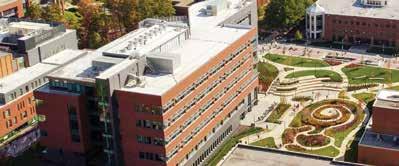
develop nonethnic Korean speakers so that they might succeed in their respective global careers.
This June 12 to 15, Mason Korea celebrates its first decade with a series of events that culminates with the campus’s eighth graduation ceremony. So far, more than 400 Mason alumni have graduated from Mason Korea. This graduation is the last for Mason Korea dean Robert Matz, who returns to Virginia this summer after serving for five years in Songdo.
“The great success of Mason Korea testifies to the Mason belief in diversity and connection to our global community,” says Matz. “Our students have not only proven to be bilingual and bicultural but also have shown the world that a diverse and inclusive environment met with grit and audacity is the key to success.”


Schar School professor J.P. Singh researches how bias and preferences shape everything from global economic policy to AI—and how to bring people together to create a more equitable world.
GO.GMU.EDU/ BUILD-BETTER-WORLD
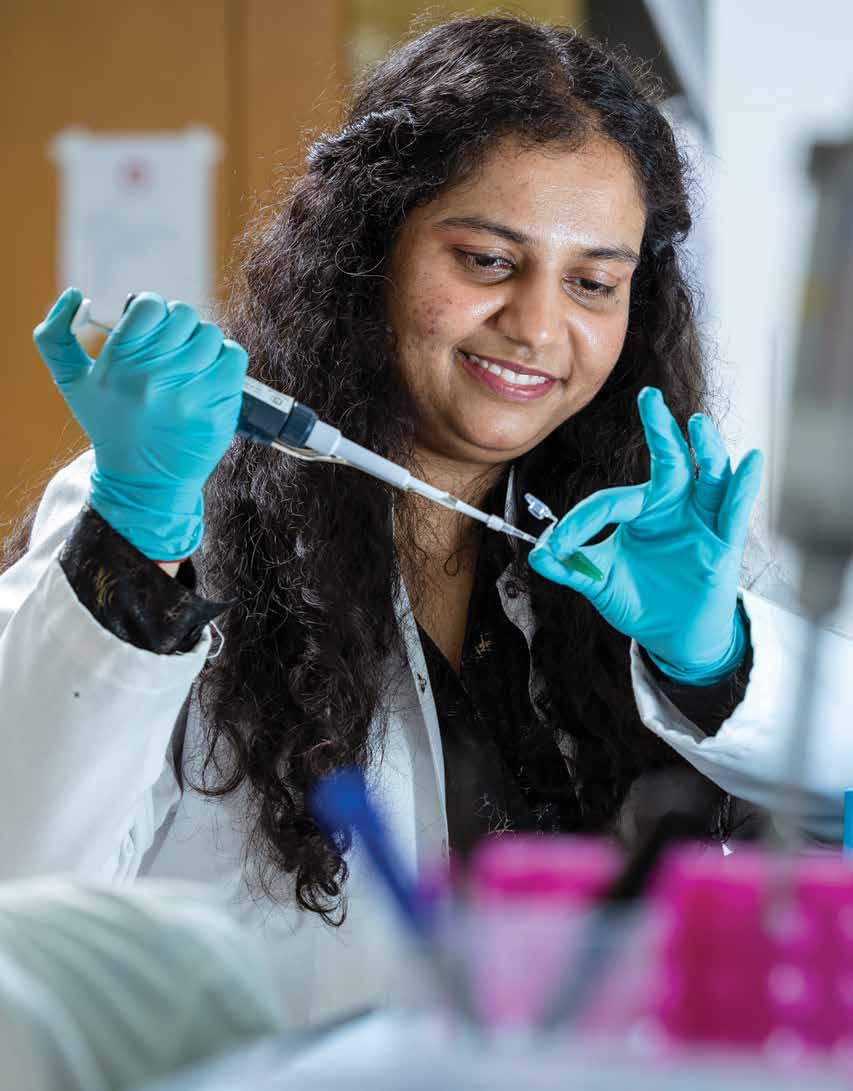
Entrepreneur Shrishti Singh in her lab on Mason’s Science and Technology Campus.
As Virginia’s largest public research university, Mason is an economic driver in the region and the state.
BY COLLEEN KEARNEY RICH, MFA ’95 5
When Shrishti Singh, PhD Bioengineering ’22, came to George Mason University for her doctoral studies, she had a goal in mind: developing a new technology that would allow the visualization of cancer in deep tissue and perhaps enable earlier diagnoses.
Using a combination of FDA-approved dyes and photoacoustic imaging, Singh created an injectable dye that attaches to tumor cells and increases the contrast of those cells against the background tissue.
During her time at Mason, Singh used all the tools the university provided to bring her discovery to the marketplace. In April 2023, Singh was on one of the 15 teams that competed for $40,000 in prizes at the Costello College of Business Patriot Pitch Competition. She took home first place and the Mason’s
Choice Award in the competition’s science, technology, engineering, and math (STEM) track.
In November 2023, Singh was at Mason Square pitching her technology at Mason’s annual Accelerate Investor Conference, which attracts more than 400 entrepreneurs, investors, students, and members of the Washington, D.C., entrepreneurial ecosystem. She was also awarded $75,000 by the Virginia Innovation Partnership Corporation’s Commonwealth Commercialization Fund.
Singh, now a postdoctoral fellow at Mason, cofounded her company NIRView Biosciences with her bioengineering faculty mentors Remi Veneziano and Parag Chitnis. Singh and NIRView Biosciences have been designated a 2023 Virginia Small Business Development Center (SBDC) Success Story.
The Virginia SBDC, a part of Mason Enterprise, is an organization of 25 offices across Virginia providing professional advising and resources to help businesses grow. Singh participated in its Innovation Commercialization Assistance Program (ICAP), a nocost incubator that helps technology start-ups from ideation to initial funding and beyond.
NIRView Biosciences worked with ICAP’s life science business mentors over the course of a year to position their technology for successful commercialization, and in 2023 they were accepted into the National Science Foundation’s I-Corps program,
POWERHOUSE OF INTERWOVEN FEDERAL, STATE, AND LOCAL PROGRAMS.
— Paula Sorrell
which provides financial support and experiential education to help university researchers commercialize scientific discoveries.
Singh was one of 30,000 entrepreneurs who participated in a Virginia SBDC workshop, seminar, or training in 2023. Through its 16 programs, the Virginia SBDC helped 10,000 businesses, provided 40,000 hours of one-on-one counseling, offered 1,600 training programs, and incubated more than 550 companies with an impact of $3.36 billion. Of the businesses they served, 61 percent were womanowned, 46 percent were minority-owned, and 15 percent were veteran-owned.
Paula Sorrell, associate vice president of innovation and economic development, leads Mason Enterprise. This university-based economic development organization focuses the energy, skills, and intellectual capital of Virginians on lab-to-market expansion of university research, new company creation, and small business expansion. Virginia Business magazine recently named Sorrell to its list of 100 Virginians to Meet in 2024: Innovators.
“Mason has used its university position to develop a powerhouse of interwoven federal, state, and local programs,” says Sorrell. “But even more critical are the partnerships among the private and public organizations that help support and codevelop the programs and mentor innovators.”
Through a broad array of activities that include business counseling, workshops, training, and connections to Mason assets—faculty research, classes, and potential interns—Mason Enterprise strengthens the strategy development and operations of businesses, governments, and other institutions throughout Virginia and the region. The Virginia APEX Accelerator (DoD) helps small businesses compete for government contracts, which total more than $1.5 billion annually.
The Virginia SBDC is also part of the larger Mason Virginia Promise, which offers a pathway to a bachelor’s degree or help starting a small business to any Virginian who wants one.
In 2023, Mason also expanded its small business incubator programs to the Town of Herndon, with the aim of empowering more Northern Virginia businesses with high growth potential. Herndon becomes the fifth Northern Virginia locale to partner with Mason Enterprise, joining Fairfax, Arlington, Fauquier County, and Springfield.
And the Virginia SBDC is also going global. Its International Business Development Program was a stage one and a stage two winner in the 2023 Growth Accelerator Fund Competition from the U.S. Small Business Administration. It received $50,000 and then $150,000 to build strategic partnerships that will support the launch, growth, and scale of STEM and research and development-focused small businesses that target international markets.
Mason Enterprise operates two federal programs in support of all Virginia universities: the National Science Foundation’s I-Corps program, designed to guide researchers and students on the first steps toward commercializing a technical discovery, and the National Institutes of Health’s REACH program, which funds proof-of-concept research for promising biohealth technologies.
Sorrell and her team are also mentoring entrepreneurs through the annual Accelerate Investor Conference, which is an investor event and start-up business competition held at Mason Square that showcases the mid-Atlantic region as a powerhouse for innovation and business opportunity.
The competition fuels innovation-based business growth by showcasing the best and brightest new tech start-ups to potential investors to foster their development within the region.
Among those angel investors and companies supplying prize money to Accelerate entrepreneurs was Mason alum Sumeet Shrivastava, MBA ’94. A leader in the government IT industry, Shrivastava recently launched the Shrivastava Family Refugee and Immigrant Success through Entrepreneurship (RISE) Program, which focuses on mentoring aspiring entrepreneurs from refugee and immigrant backgrounds. Nanomaterial research and development company NanoBioFAB received the Shrivastava Family RISE Program prize at last fall’s conference.
Mason’s Costello College of Business Patriot Pitch Competition offers support and resources to student-led start-ups. Now in its 23rd year, the competition is open to all Mason students and recent alumni and attracted 50 teams from across the university last year. Powering the success of the student and alumni pitch teams were more than a dozen mentors who are CEOs, consultants, entrepreneurs, start-up coaches, Mason faculty, and alumni. By sharing their real-world experience in launching and managing start-ups, mentors were incredibly valuable to the teams.
The finalists, including Singh, pitched to judging panels of local business leaders whose professional experience included consulting, derivatives exchange, energy consulting, food technology, nonprofits, and venture capital.
The Mason Innovation Exchange, also known as the MIX, is also part of Mason Enterprise and helps student entrepreneurs. With its makerspace and fabrication lab, a digital media lab, and a start-up incubator, the MIX offers creative thinkers everything from metal fabrication to business mentoring. It is open to all members of the Mason community regardless of their major or affiliation. Currently, there are six student start-ups in the MIX’s incubator.
Mentors meet individually with student entrepreneurs and provide a range of business advice.
In 2023, the Virginia Commonwealth Cyber Initiative (CCI) recognized Gisele Stolz, senior director of entrepreneurship and innovation programs at Mason, with an Impact Award for her work with its cybersecurity start-up internship program.
“From envisioning the internship program to building out the structure of the Commonwealth Cyber Incubator and Accelerator Program cohort programming, few people within the CCI network have had such a widespread impact as Gisele,” says Liza Wilson
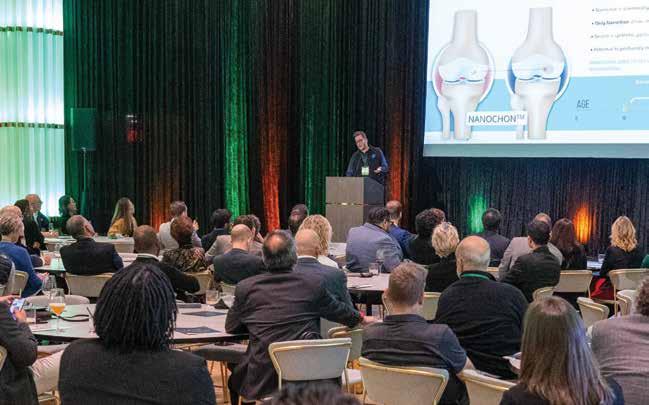
Dozens of top tech companies and 20+ student teams compete for funding from potential investors at the annual Accelerate Conference.
Durant, associate provost for strategic initiatives and community engagement at Mason and director of the CCI Northern Virginia Node.
Under Stolz’s stewardship, the internship program attracted more than 700 applicants, placing 83 Mason undergraduates with more than 50 companies. Of the students placed, 73 percent received offers for follow-up positions with their host company, including full-time employment.
Beyond this internship program, the CCI Northern Virginia Node, led by Mason and headquartered at Mason Square in Arlington, supported experiential learning opportunities for more than 3,000 students, including more than 100 internships and apprenticeships in cybersecurity.
All these Mason opportunities align with the university’s vision of graduating students who can power Northern Virginia’s economic engine and serve in areas of critical need, while also providing a pathway of opportunity to all Virginians.
“Mason is committed to providing novel and varied experiential learning opportunities for our students, preparing our workforce for the future and readying them to compete on a global scale,” says Andre Marshall, vice president of research, innovation, and economic impact at Mason.
The need for well-trained health professionals, across disciplines and among fields, is one of the most critical issues facing communities in Virginia and throughout the nation. The Mason Center for the Health Workforce was established in 2022 to help address the shortage in Virginia. The center supports the development and delivery of public-private strategies to optimize physical and behavioral health career education and postgraduate skill training. It also serves as a technical assistance center for health workforce research, program evaluation, and planning and analysis for government agencies, academic entities, and professional organizations.
Mason’s Center for Community Mental Health in Fairfax is unique in its dual function as both a working clinic and a training facility. Last year, the center helped train 77 undergraduates and 57 graduate students while providing more than 2,100 therapy sessions to the community (see story on page 10).


In 2019, Mason joined the commonwealth’s Tech Talent Investment Program (TTIP). The top TTIP goal is to build and sustain a diverse tech talent pathway, and Mason, as the largest and most diverse public university in Virginia, and the largest producer of technology talent among four-year institutions in the state, is poised to lead.
At that time, Mason agreed to educate about 30 percent of the 25,000 additional graduates in tech fields over the next two decades to serve regional and state employers, including Amazon and its HQ2. Mason continues to exceed its goals. In 2023, Mason was 281 percent over its bachelor of science target and 192 percent over its master of science target in terms of graduating students in computing and computing-related majors.
Mason is also working to add faculty members in computer science and related fields to teach and mentor these students. The College of Engineering and Computing will soon expand into Fuse at Mason Square. The college is already working to build robust curricula for students in Arlington and provides ample opportunities to explore skills through research opportunities, state-ofthe-art labs, hackathons and competitions, and student organizations.
From Mason Square in Arlington to the Science and Technology Campus in Manassas, Mason is building a new economic corridor along Route 66 in Northern Virginia.
Fuse at Mason Square, the university’s LEED Platinum building opening this summer, is a digital innovation center that will house research and development labs, corporate centers, incubators, accelerators, and convening spaces, alongside classrooms and retail spaces.
The SciTech Campus is home to the new outdoor Forensic Science Research and Training Laboratory— or “body farm,” one of only eight in the country—and the Biomedical Research Lab, one of 13 biosafety level-3 labs in the nation.
New to this campus is the Nanofabrication Facility, which is the only cleanroom facility and resource of its kind for partners in Northern Virginia and offers hands-on nanofabrication workforce training in research applications that will accelerate the growth of high-tech companies.
“The most powerful asset we offer is opportunity,” says Marshall. “Only through providing opportunity can we educate, inspire, and equip the next generation of leaders to solve the grand challenges of our day.”
Jennifer Anzaldi, John Hollis, Katie Maney, and Ryley McGinnis contributed to this feature.
Computer science student Quang Vo demonstrated virtual reality applications that will be part of the visualization labs at the Fuse at Mason Square.
LEARN MORE ABOUT TECH TALENT AT MASON go.gmu.edu/ TechTalent

Mason students are in demand, and University Career Services helps them connect with employers through a variety of resources and events.
BY PRESTON WILLIAMS
Information technology major Christina Tran arrived two hours early to the first day of the Spring 2023 Career Fair in Dewberry Hall on George Mason University’s Fairfax Campus to study the list of employers sending recruiters. She researched the companies to find ones that best matched her career goals, then circled their booth locations on an event map to prioritize those encounters.
Over the course of five hours, she visited 65 of the 120 booths. And then, after the last hand was shaken and the last business card tucked away, she attended a three-hour reception that extended the fair at the Center for the Arts, visiting 20 more employers. Then she returned the second day and visited at least 30 more.
“First in line both days,” Tran says.
Her strategy paid off. Tran, who graduates in May, landed a position as a Microsoft Solutions consultant with FSi Strategies, one of six offers she says she received from employers she met during the fair.
“The career fair got me this job,” says Tran, who wrote personalized follow-up emails to each employer she spoke with, drawing from notes she took during each conversation.
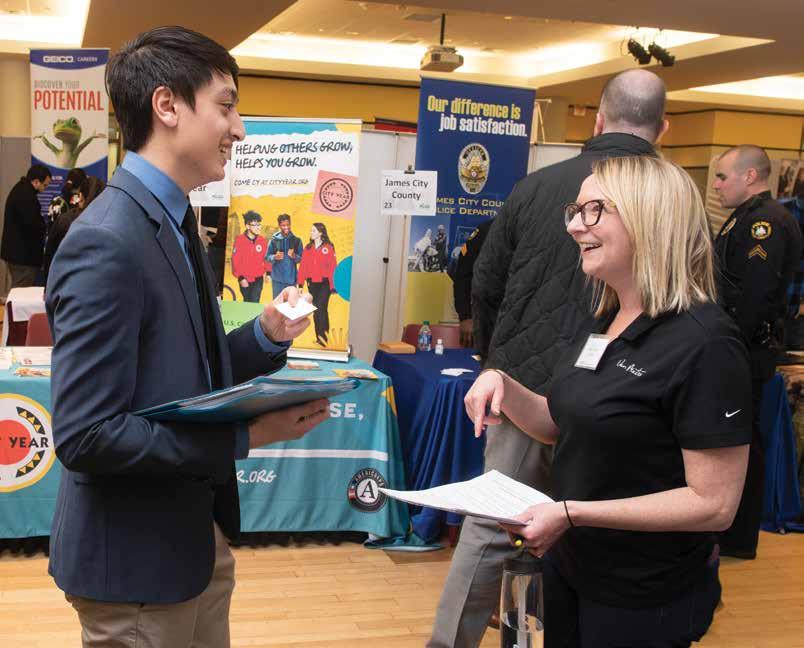
A MEDIAN SALARY OF $72K IN POSITIONS RELATED TO THEIR CAREER GOALS 89% OF RESPONDENTS REPORTED CAREER ADVANCEMENT WITHIN SIX MONTHS OF GRADUATING 87% WORK IN THE WASHINGTON, D.C., REGION 86%

Drawing from her own experiences and other resources, Tran has compiled a detailed checklist for job seekers, including tips on choosing attire, identifying prospective employers, and showing up with the proper materials.
I’M CAREER-READY. I WANTED TO PROVE THAT. I WANTED A JOB, AND I WAS FOCUSED AND HAD A PLAN AND DID IT.”
—Christina Tran
“You need to come ready—[business] clothes on, resume printed, know your elevator pitch,” adds Tran, who previously worked at Deloitte and had several years of management experience at spas. “I’m career-ready. I wanted to prove that. I wanted a job, and I was focused and had a plan and did it.”
Tran is indeed a model student when it comes to preparing to enter the job market—University Career Services was so impressed with her preparation and performance that they asked to take her picture at the event. Tran’s image now graces the cover of the university’s annual Career Readiness Guide
Mason graduates land jobs. Based on the annual career outcomes survey and supplemental data collected from sources like LinkedIn and the National Student Clearinghouse for the Class of 2022, 87 percent of Patriots have a positive career outcome within six months of graduation, and 89 percent say they are in positions related to career goals. Most stay local—86 percent are employed in the District of Columbia, Maryland, or Virginia. The respondents’ median salary is $72,000.
These outcomes are similar to prior years, and the Class of 2023 numbers are still being analyzed. But Saskia Campbell, executive director of University Career Services, says even more Mason students need to increase their engagement in the job-seeking process.
Throughout the year, Mason offers 11 career fair days to provide face time for employers with students and graduates. One is the Just-in-Time Hiring Fair, which is held the week after Commencement. In May 2023, the event drew nearly 100 employers and 700 job seekers, and Campbell expects this year’s event to be just as popular.
“Most colleges and universities aren’t able to sustain an event that late in the [academic] year,” Campbell says. “It means that our job market is really, really strong and that there are opportunities year-round. There is always hiring happening here.”
Tran upped her Career Fair game after previously attending one that resulted in no offers. For the next fair, instead of arriving an hour after the fair started, she showed up early. She spent more time on a professional appearance. She honed an informative yet tight elevator pitch.
“I really wanted to be recognized,” Tran says. “You have to be able to take what you failed from and jump back from it.”
The daughter of immigrants and the middle of five children, Tran was the first of the five to complete high school. At 19, while attending Northern Virginia Community College (NOVA), she gave birth to a daughter, Collette. She graduated from NOVA with an associate of science degree and examined her options.
“I knew that Mason and going to college were the only way to get to the future that I wanted,” she says. That includes her concentration in cybers security and minor in criminology, law and society.
Tran works with Mason tutors, mentors, and teaching assistants to make sure she understands the course material. She color-codes priorities. She budgets her social time frugally, often focusing on events hosted by campus organizations she supports, such as the Vietnamese Student Association, the Filipino Cultural Association, and the Society of Women Engineers.
Her best friend? LinkedIn.
“I could have chosen not to go to school and to work full time, but I know I’m capable of finishing the program and a degree,” Tran says. “I feel like I’m meant for more. I love the stability of knowing for certain that I’ll graduate and people will hire me.”
“Mason has opened many doors for me. I’m motivated to get to a leadership position one day. I know I can make a difference.”
More than 12,000 employers on Handshake and other University Career Services platforms help support work-based opportunities for Patriots, including internships, work–study, and part-time and full-time positions.
Microcredentialing: Mason’s new approaches to microcredentials allow students to demonstrate specific technical, leadership, and professional skills that go above and beyond their specific degree programs and improve their career readiness. Additionally, Mason has established relationships with leading technology companies, like Google, to offer their professional certifications in areas such as data analytics, cybersecurity, and cloud computing to further differentiate Mason students and their learning experience.
Alumni Association: Mason’s Alumni Association partners with University Career Services to provide continued support at each stage of a Patriot’s career. They also provide webinars and networking and mentoring opportunities for Mason’s 230,000+ alumni to connect with students and each other.

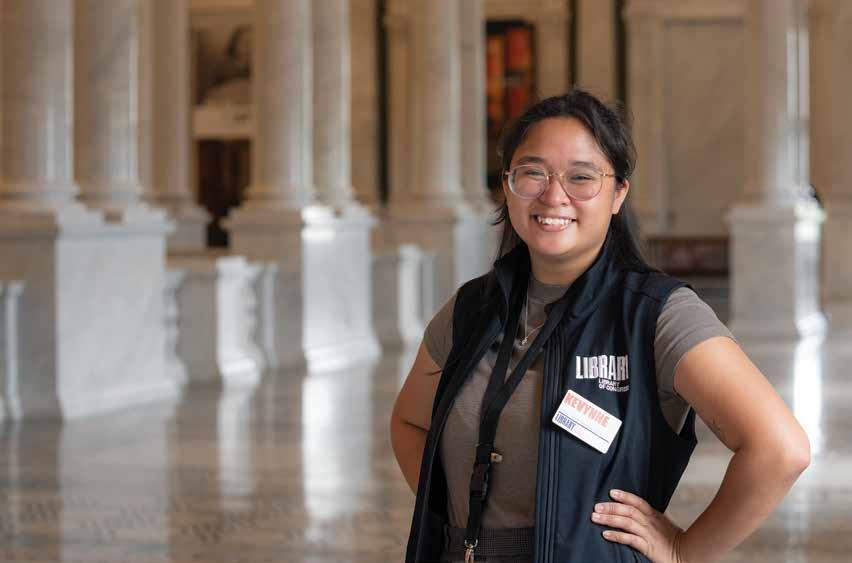
Practicum, field placement, internship—no matter what you call it, work-based learning is a critical part of any student’s career preparation. Not only do these experiences introduce students to their chosen career and help confirm or rule out job choices, they are the surest path to a full-time job.
“Employers are more likely to convert interns to new hires than any other kind of positions,” says Saskia Campbell, executive director of University Career Services (UCS) at George Mason University. “That’s their recruitment strategy. That’s their pipeline.”
And Campbell says Mason students are in demand.
During the 2022–23 academic year, employers posted 29,729 internships on UCS’s Handshake job search site. That’s doubled from a prepandemic 13,558 postings in 2019–20.
Beyond Handshake, Mason students find internships by leveraging their personal connections and relationships with faculty who have close ties to federal agencies, government contractors, and nonprofit organizations in the Washington, D.C., area.
Some Mason students are even interning abroad through a program in Mason’s Global Education Office. In 2022–23, 82 students from 32 majors interned in countries such as Japan, Morocco, and South Korea.
In this feature, we take a look at some of the Mason undergraduates who held internships in the summer of 2023.
When English major Kevynne Dimaano began her summer internship at the Library of Congress (LOC), she could not have anticipated how her Mason education—including linguistic studies in syntax and language construction—would influence her experience.
Dimaano worked with two LOC departments: the Informal Learning Office, dedicated to connecting children and families to library resources, and the Visitor Engagement Office. Her days were split between the two roles.
Working in a public-facing role comes with unique challenges. The library receives up to 4,000 visitors a day, so Dimaano needed to problem-solve to help guests quickly. Her Mason language requirement became an invaluable asset.
“I took Mandarin, and the library sees a lot of guests who speak Mandarin,” she says. “Even though I’m not fluent, being able to communicate with them in their native language was really useful. And it was good practice!”
For her summer project using resources in the library, Dimaano decided to create an activity using rebuses for the library’s mystery-themed family day in October.
Rebuses, which were popular newspaper games in the 1930s and ’40s, are language puzzles that combine pictures and letters to form words the player has to decipher. With her Mason linguistics education, Dimaano was well suited to pick up the patterns needed to create her own.
“I love mysteries,” she says. “Looking back through the old newspapers was really interesting. It was like a time machine.”
If the library is hiring when she graduates, Dimaano says she will definitely apply. “It was an amazing experience. I felt so welcomed there.”
—Sarah Holland
Marcou Shohdi, BS Business ’23, had a plan for his time at Mason: get experience in public, corporate, and government accounting.
Shohdi, who was born in Egypt and lives in Gainesville, Virginia, transferred to Mason from Northern Virginia Community College, where he earned his associate’s degree in business administration. For him, accounting as a major and a career was a clear choice.
With six years in corporate accounting under his belt from his day jobs, Shohdi decided to give government accounting a try.
Last summer Shohdi was one of four Mason students chosen for an internship in the U.S. Navy’s Financial Management and Comptroller (FM&C) Office. The program, a partnership between FM&C and Mason’s Costello College of Business, was established by Dean Ajay Vinzé and Mason alum Alaleh Jenkins, BS Accounting ’97, who is principal deputy assistant secretary of the Navy, to bring new talent to government service.
Shohdi made the most of his time working at the Navy Yard and even completed the 23 courses required to obtain a level 1 U.S. Department of Defense financial management certification.
“The skills I’ve gained in feedback coordination, status tracking, and collaboration are invaluable,” says Shohdi. “Tracking responses and contributing to revisions has honed my process improvement abilities.”
What’s next for Shohdi is public accounting. Following graduation in December, he started an internship with KPMG, one of the Big Four accounting firms, in January.

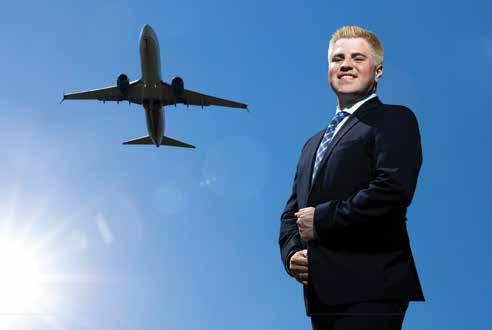
What does law school have to do with airplanes? For Scalia Law School student Mack Freilich, who has a strong affinity for flight, both things are an extension of doing what he loves.
Last summer Freilich interned for the Washington Aviation Law Group, a boutique law firm in Washington, D.C., that specifically focuses on aviation law. Freilich gained valuable firsthand experience by taking part in case reviews and other critical aspects of the legal process, including sitting in on meetings with staff from the Federal Aviation Administration. During the fall semester, Freilich returned to the Washington Aviation Law Group as an extern.
“It’s really opened my eyes to see how much aviation law intersects with other parts of the law,” he says.
Those who know Freilich would hardly be surprised to hear that aviation would be in his future. After working his way through Roger Williams University in Rhode Island, where he earned a bachelor’s degree in paralegal studies in 2022, Freilich worked for a time as a flight attendant at PSA Airlines, a regional subsidiary of American Airlines, enabling him to travel.
Freilich credited his decision to attend Scalia Law School for the tremendous opportunities he’s received so far, calling it “an immensely beneficial decision that has enriched both my personal and professional journey in profound ways.”
—John Hollis
Arts management major Alexandra “Ali” Coburn loves working on and off the stage. Originally from Houston, Texas, Coburn studied voice at the Potomac Vocal Institute, where she made many connections in the performing arts. But her coursework at Mason showed her a different side of the field. “Arts management was eye-opening for me [because] it’s so versatile, and it incorporates so well into my performing career,” she says.
When she needed to complete volunteer hours for her AMGT 405 Introduction to Arts Management class, she put out an inquiry on Facebook—and Erin Feng, the executive director of Capital City Symphony, responded.
“When I started working for the symphony, I told [Feng] that I would eventually have to do an internship as well,” says Coburn. “Based off the work I had done while volunteering, she offered me an internship working mainly in development and operations.”
Coburn’s responsibilities included creating content for social media, various writing assignments, and designing a quarterly newsletter.
“I’ve done a lot of teaching and performing, but never anything on the administrative side,” says Coburn, who is also the musical director and director of handbell choirs at Browne Academy in Alexandria, where she works with students through the eighth grade. She also gives voice and piano lessons.
Although Coburn’s internship ended in August, she continues to work at Capital City Symphony as the executive director’s assistant. “I’ve really enjoyed everything I’ve been working on. This is definitely something I was meant to do.”
“I love that I’m part of a company that shows the D.C. community what true value classical music has for anyone willing to attend.”
—Shayla Brown
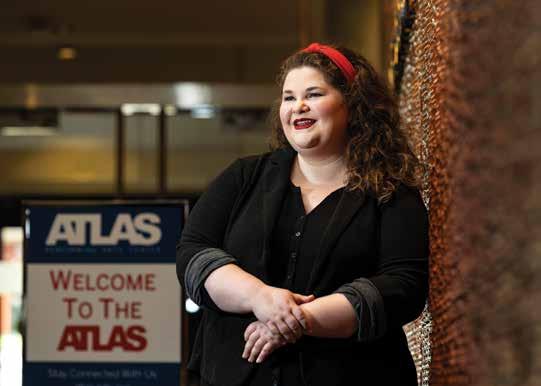
Unpaid internships, while often touted as a necessary gateway to a dream job, can equally be a barrier for students who may lack the funds for a professional wardrobe, child care, or who simply can’t take on extra hours in addition to working part- or full-time jobs.
And that’s where Mason’s commitment to access via the Scholarship for Unpaid Internships comes in. Open to all undergraduate and graduate Mason students, the scholarship offers a much-needed infusion of funding that can often mean the difference in allowing a student to take on a career advancement opportunity without compromising themselves financially.
According to Saskia Campbell, executive director of University Career Services (UCS), Mason is filling a gap that can make all the difference in a student’s future. “Internships lead to job offers and higher starting salaries, and University Career Services is focused on creating more inclusive pathways for students to gain relevant experience,” says Campbell.
First established in 2017, the scholarship has grown significantly. According to Rebekah Truog, office manager at UCS, 160 students have thus far benefitted from the scholarship with close to $250,000 distributed. Initial funding for the scholarship came from the University Life Parents Fund, which continues to occasionally contribute.
“Most of our funding comes directly from our Career Fairs,” says Truog. “We also get funding from our Employer Partner Program, as well as direct donations. Of those direct donations, 100 percent goes to funding the scholarship.”
And with those funds, students get to take on opportunities that can make a real difference in securing them a career in their dream field after graduation. Truog says Mason students have interned with and gained valuable experience from community health organizations, nonprofits, nongovernmental organizations, and the federal government.
For some of these students, an internship is necessary to gain professional hours required for licensure. This was the case for Nathan Park, who is pursuing an MEd in counseling and development, with a concentration in clinical mental health counseling.
“My internship allowed me to obtain counseling hours so that I may apply for licensure in the state of Virginia,” says Park. “Receiving the scholarship alleviated my financial distress in paying for gas and rent.”
Kinesiology major Kayleigh Newman received the scholarship this past fall to intern at Innovative Physical Therapy and Wellness. “My internship has really confirmed to me that this is the right career path for me.”
Yuliana Rud, a tourism and events management major, echoes the sentiment. Rud interned in Argentina with Hola Veggie, a plant-based meal kit company. “I’m now more sure than ever that the major and career path I’ve chosen is right for me, and this internship was a big factor in that,” she says.
—Priyanka Champaneri, BA ’05, MFA ’10

MY INTERNSHIP ALLOWED ME TO OBTAIN COUNSELING HOURS SO THAT I MAY APPLY FOR LICENSURE IN THE STATE OF VIRGINIA.”
—Nathan Park
BY RON AIRA

A team of George Mason University scientists has received a federal grant of more than $13.6 million to work with the U.S. Department of the Navy to study and better understand increased solar activity that could potentially cause an “internet apocalypse” that would disrupt all of Earth’s electronic communications, including satellite communications.
The Mason scientists will collaborate with the Naval Research Laboratory (NRL) on research that includes state-of-the-art data mining, analysis, and scientific modeling.
“This work is especially important to the Department of Defense because high-energy outbursts from the sun can have a strong negative impact on earthly radio and internet communications,” says principal investigator Peter A. Becker, a professor in the Department of Physics and Astronomy within the College of Science, who notes that such bursts can also have a detrimental effect on navigation systems and energy grids.
This violent solar activity includes bursts of radiation, high-speed electrons, and other highly energetic particles that are launched into space and can disrupt technologies such as the internet. Much of this activity can reach Earth in less than a day.
Violent solar storms are expected to become more frequent and more severe over the next 10 years, and these events possess the potential to severely interfere with radio transmitters, navigation and GPS, satellite operations and communications, and the electric power grid. The ability to more effectively anticipate these instances will help better protect the public and our infrastructure.
“The internet was simply not designed to handle this level of communication interference, and, consequently, is considered a very ‘soft’ type of infrastructure,” Becker says. “Hence, the period from 2024 to 2028 is a time when the entire internet could conceivably be knocked out for a period of weeks to months in the event of a really extreme solar flare.”
Because of the world’s heavy dependence on the internet for information, communications, and global commerce, such a scenario could create “an unprecedented disaster for modern society, potentially triggering a worldwide recession,” says Becker.
Most of the Mason team’s work will be performed at the NRL in Washington, D.C., although space has also been allocated at Mason’s Fairfax Campus to accommodate visiting NRL scientists working on joint space science research projects.
—John Hollis
In a win for tackling climate change on a regional level, Mason’s new Virginia Climate Center (VCC) is leading research on climate-related challenges such as energy, extreme weather, and flooding in the Commonwealth of Virginia. Funded through the National Oceanic and Atmospheric Administration and sponsored by U.S. Representative Gerry Connolly (D-VA), this two-year, congressionally directed community project seeks to increase Virginia’s resiliency to the impacts of climate changes and variability.
“We have high hopes that the Virginia Climate Center will become the go-to resource for communities in the commonwealth to understand their climate risks and find more resilient ways to protect themselves from threats to human health, life, livelihood, and property,” says Jim Kinter, director of the Center for Ocean-Land-Atmosphere Studies at Mason.
“This boundary-spanning center is bringing together academic disciplines, municipalities, and the business community to form a new university-based cooperative framework that not only addresses the challenge of resilience, but also establishes a community-engaged model for universities to tackle the grand challenges of our time,” says Andre Marshall, vice president of research, innovation, and economic impact.
One of VCC’s current projects is with the City of Alexandria to address extreme heat in the region through case studies and data collection of successful adaptation strategies in urban settings, such as cooling centers.
VCC is also working closely with Mason’s College of Engineering and Computing and the Northern Virginia Regional Commission (NVRC) on the installation of flood sensors and the development of a real-time flood forecasting system for the region.

Flooding and extreme weather have devastating impacts on our communities and the commonwealth infrastructure and economy. Studies by Mason researchers predict more intense and stronger storms in our region, stressing our infrastructure and likely increasing the impacts of extreme weather in our area.

“My work on the NVRC project holds the potential to greatly benefit our region,” says Mason graduate student Zeeshan Khalid. “By proactively identifying and addressing road closures during flash floods, we aim to minimize disruption, reduce property losses, and enhance community safety.”
The VCC team plans to expand outside of Northern Virginia soon, aiding Virginia’s rural communities in their climate resiliency and, eventually, mitigation planning.
—Maha Aamir
Mason physicist Fereshte Ghahari Kermani is the first Mason faculty member to receive the highly competitive U.S. Department of Energy Early Career Award, which highlights the significance of her contributions to the field of condensed matter physics. Kermani, an assistant professor in the Department of Physics and Astronomy, is studying the quantum electronic properties of charge carriers in graphene nanostructures.
There might be a next-generation security solution right at your fingertips, but not in the way you might think.
Mason researcher Emanuela Marasco is working on an innovative way to verify human identity by using sweat samples collected from fingertips. According to Marasco, your sweat makes you unique. The key to identification is to properly detect sweat metabolites—small molecules, such as lipids or amino acids, that result from metabolic processes in your body.
Supported by an Early-Concept Grant for Exploratory Research from the National Science Foundation, Marasco is using hyperspectral imaging (HSI) to peer into sweat and look at three specific metabolites. HSI can find and identify materials invisible to the human eye and other technical viewing equipment.
According to Marasco, HSI creates a representation of an object by capturing the light bouncing off it, which can relate to its chemical makeup. Among the benefits of sweat analysis for identification is that it is rapid and noninvasive.
HSI avoids the shortcomings of current systems, which are prone to spoofing—one thing disguised as another—and morphing—for example, the

alteration of travel-document photographs—and which do not consistently work across different skin tones.
“Traditional approaches to spoofing are now in danger, because they cannot fool HSI,” says Marasco, an assistant professor in Mason’s Department of Information Sciences and Technology and the Center for Secure Information Systems.
“I see a wide range of applications [for this technology],” says Marasco. “Simply looking into the application of HSI to skin could yield numerous findings. There are transformative aspects to this research.”
—Nathan Kahl
Mason College of Public Health dean Melissa J. Perry was part of a team that has found a strong association between insecticide exposure and lower sperm concentration in adult men globally.
The team conducted a comprehensive review of 25 studies of occupational and environmental insecticide exposure over 25 years. After looking at decades of human evidence regarding the health impacts of exposure to two widely used insecticide classes, organophosphates and N-methyl carbamates, they found consistent associations with lower sperm concentration.
The resulting paper, “Adult Organophosphate and Carbamate Insecticide Exposure and Sperm Concentration: A Systematic Review and Meta-Analysis of the Epidemiological Evidence,” was published online in Environmental Health Perspectives.
“This review is the most comprehensive evidence sizing up more than 25 years of research on male fertility and reproductive health,” says Perry, the senior author on the paper. “The evidence available has reached a point that we must take regulatory action to reduce insecticide exposure.”
—Mary Cunningham

BY JASPER
Can wearable technology resolve the crisis of underemployment among neurodivergent individuals? With the support of a National Science Foundation (NSF) grant, a Mason team aims to find out.
Business environments can present all sorts of stressors that can affect the productivity and the mental health of neurodivergent individuals—but wearable technology like smartwatches or other wrist devices can help. After detecting a moment of peak stress, often accompanied by an increased heart rate, the technology can remind users to take a short break or do breathing exercises. These interventions help users adjust to difficulties in their environment and alleviate that stress.
Now, to further develop these types of wearable technologies that can help neurodivergent individuals succeed in the workforce, Mason researchers Vivian Genaro Motti and Sarah Wittman have received a $1.87 million NSF grant.
The concept for the project originated in 2017 with Motti’s contribution to developing WELI, a smartwatch application designed to assist students in Mason LIFE, a four-year transition program for young adults with intellectual and developmental disabilities. The WELI project was funded as part of a threeyear grant from the National Institute on Disability, Independent Living, and Rehabilitation Research.
After WELI showed impressive results in a field study, the team expanded the scope of the project beyond the college campus. Motti started to investigate how such technology could be adapted for the workforce. She joined forces with Wittman, a widely published management scholar at the Costello College of Business who specializes in work–life transitions.
They set out to better understand the pain points neurodivergent individuals face at work. Supported by seed funding from Mason’s Institute for Digital Innovation and the work of doctoral student Niloofar Kalantari, the researchers’ data analysis revealed a wide range of challenges, with a high degree of variation correlated to different types of neurodivergence (ADHD, autism spectrum disorder, Down syndrome, etc.). This confirmed their hypothesis that a one-size-fits-all wearable solution is not viable; instead, they began to pursue interventions tailored to individual user needs and specific segments of the neurodivergent population.
Through a series of laboratory experiments, Motti and Wittman will refine the wearable technology and assess its positive impact upon both task-based performance and user well-being. Finally, they will launch a three-week field study intended to test real-world efficacy and build guidelines for this technology.
Beyond making life easier for neurodivergent individuals in the workplace, Motti and Wittman believe that their interventions will generate useful data for making work environments more inclusive.
—Benjamin Kessler

Vivian Genaro Motti

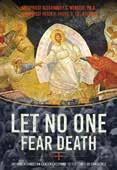
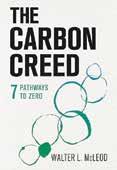


Let No One Fear Death: Orthodox
Christian Leaders Respond to the COVID19 Challenge
Fr. Alexander F. C. Webster, adjunct professor, Religious Studies Department, with Fr. Peter Heers (Eds.)
Uncut Mountain Press, June 2022
This collection of essays by Eastern Orthodox clergy and other scholars addresses the public challenge, methodology, trauma, and distortion of the recent COVID-19 narrative from theological, philosophical, medical, and personal perspectives.
The Carbon Creed: 7 Pathways to Zero
Walter McLeod, MS Chemistry ‘94, professor of practice, College of Science
New Degree Press, March 2023
The ultimate guide to decarbonize your beliefs, values, and practices, this book will help you to navigate the climate narratives in your head and heart.
Negotiation, Identity, and Justice: Pathways to Agreement
Daniel Druckman, Professor Emeritus, Schar School of Policy and Government Routledge, April 2023
Containing research conducted and published over a half century, the volume is divided into seven thematic parts that cover the multifaceted career, flexibility in negotiation, values and interests, turning points, national identity, and process and outcome justice. The book provides rare glimpses of behind-the-scenes networks, sponsors, and events, with personal stories that also make evident that there is more to a career than what appears in print.
Proactive Mathematics Coaching: Bridging Content, Context, and Practice
Courtney Baker, associate professor, College of Education and Human Development, with Melinda Knapp National Council of Teachers of Mathematics, July 2023
In Proactive Mathematics Coaching, the reader is introduced to the Proactive Coaching Framework to help those in formal and informal mathematics leadership positions intentionally refine and advance their practice through goal setting and planning for professional learning.

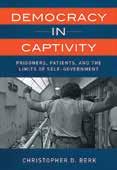

Senior Leadership Teams and the Agile Organization
Stephen J. Zaccaro, professor, Psychology Department, and Richard Klimoski, professor, Costello College of Business, with Nathan J. Hiller Routledge, July 2023
Senior Leadership Teams and the Agile Organization builds on existing knowledge in the leadership, teams, and strategic management literatures to examine and explore how senior leadership teams drive the dynamic capabilities of organizations. The book is essential reading for researchers and professionals looking to understand the intersection of leadership, team dynamics, organizational psychology, and strategic management.
Christopher D. Berk, assistant professor, Schar School of Policy and Government University of California Press, August 2023
Democracy in Captivity centers on two case studies at custodial institutions: the rise and demise of patient self-governance at St. Elizabeth’s Hospital in Washington, D.C., between 1947 and 1965 and the prisonerorganized governance of Massachusetts’s Walpole State Prison following a 1973 prison guard strike. Berk explores pathologies that have captured the politics of punishment, with pressing implications for the practice of democracy both inside and outside custodial institutions.
Joseph A. Scimecca, professor, Sociology and Anthropology Department
Routledge, August 2023
This book provides a rationale for a Christian sociology, challenging the materialist epistemology of contemporary sociology, which provides only a limited understanding of social behavior. Developing a history of the origins of sociology that recognizes the centrality of Christianity to the discipline’s development, it considers the secularization thesis and questions surrounding positivism, scientism, and postmodernism.


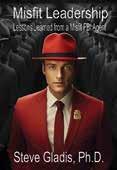
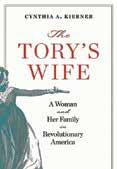

The Burning of the World: The Great Chicago Fire and the War for a City’s Soul
Scott W. Berg, MFA Creative Writing ‘97, professor, English Department
Knopf Doubleday Publishing Group, September 2023
An account of the Great Chicago Fire and an eye-opening look at its aftermath, The Burning of the World tells the story of one of the most infamous calamities in history and the new Chicago it precipitated—a disaster that still shapes American cities to this day.
Misfit Leadership: Lessons from a Misfit FBI Agent
Steve Gladis, PhD Education ’91, senior scholar, Center for the Advancement of Well-Being
Steve Gladis Leadership Partners, September 2023
Misfit Leadership is about leveraging one’s differences or nonconformity to become assets, not liabilities. The book focuses on how the author, a dyslexic, ADHD, bigpicture guy, sneaks into the detail-oriented world of evidence collection, fingerprint analysis, and meticulous documentation of the FBI.
The Tory’s Wife: A Woman and Her Family in Revolutionary America
Cynthia A. Kierner, professor, History and Art History Department
University of Virginia Press, September 2023
This book tells the story of Jane Welborn Spurgin, a patriot who welcomed General Nathanael Greene to her North Carolina home and aided Continental forces while her loyalist husband was fighting for the king as an officer in the Tory militia.
Revolutions: A Very Short Introduction
Jack A. Goldstone, professor, Schar School of Policy and Government
Oxford University Press, November 2023
Goldstone explores the structural and cultural approaches to revolution studies that leaves readers with a broader understanding of historical events and the roles of cybersecurity and the media in modern revolutions. Revolutions takes a journey through Ancient Greece and Rome to modern day revolutions and overthrows.

Since 1989, more than 3,000 people have been exonerated after being wrongly convicted. In his new book, The Politics of Innocence: How Wrongful Convictions Shape Public Opinion (New York University Press, September 2023), Robert J. Norris, associate professor in the Department of Criminology, Law and Society, and his coauthors explore the political dynamics that shape the innocence movement.
What inspired you to write this book?
After exploring how wrongful convictions had become such a prominent advocacy issue in the criminal legal system, I was left with lingering questions about how much the public knew about [wrongful convictions] and how they responded to information about them. Around that same time, one of my coauthors and I were having lunch and discussed the first season of the podcast Serial, which was about a likely wrongful conviction. We were talking about how those sorts of stories made people nervous and wondered how common that feeling was. We began designing our first study and now, seven years later, here we are!
Was there anything that surprised you in the research for this book? Throughout the book, we show that wrongful convictions can change people’s support for the death penalty and their trust in the criminal justice system generally. However, we were a bit surprised to find that we could not change people’s trust in police, even when explicitly telling people about the role of police in wrongful convictions. Those attitudes appear to be more entrenched and resistant to change than others. Another thing that is perhaps not surprising, but definitely heartening, is that while innocence reform is political, people across the ideological spectrum can be persuaded to support changes that would help improve our legal system. We can cut through some of the ideological noise and appeal to a variety of different people.
What are you working on now?
I’m currently working on a variety of things. Some of these projects are still related to innocence, including work on the racial history of wrongful convictions, the post-release experiences of wrongly convicted people, narrative language in wrongful convictions, and the relationship between the innocence movement and the anti-death penalty movement. Other work is more generally tied to public opinion, such as the process that leads people to support punitive practices and the effects of the language we use to discuss incarcerated populations. I’m also beginning to explore some broader conceptual ideas about completely unrelated issues, which is really exciting for me.
—Colleen Kearney Rich, MFA ’95

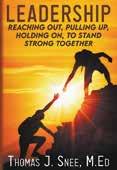
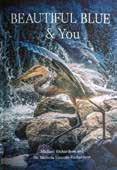

Leadership: Reaching Out, Pulling Up, Holding On, to Stand Strong Together
Thomas J. Snee, MEd Educational Leadership ’06
Leadership (MindStir Media, March 2022) details the experience of shipmates and the journey they undertake in forging friendships in leadership.
Snee retired in September 1996 as force master chief, U.S. Navy Recruiting Command. As a master chief navy counselor (surface warfare), he served in many leadership and managerial positions both on ship, staff, and shore commands.
Melinda Lincoln Richardson, MA New Professional Studies ’98, DA Community College Education ’00, and Michael Richardson
In Beautiful Blue & You (independently published, January 2023), Richardson expresses her appreciation of the blue heron’s beauty with words and photography.
Richardson is an educator and writer.
in Rome
Liam Callanan, MFA Creative Writing ’93
A book filled with romance, faith, discovery, and twists, When in Rome (Dutton, March 2023) depicts the life of Claire, someone looking to have a fresh start and time to reflect. She stays with a convent of witty and adventurous nuns while grappling with her relationship with her faith and a possible reconnection with a longtime friend.
Callanan, an English professor at University of Wisconsin–Milwaukee, has published award-winning novels including Paris by the Book. He won the 2019 Edna Ferber Prize and the 2017 Hunt Prize and was a finalist for an Edgar Award. He has also contributed to public radio stations. He lives in Shorewood, Wisconsin, with his wife and children.
Jacqueline
This book (New York University Press, April 2023) explores the ways in which women in Revolutionary War-era Boston, Philadelphia, and Charleston shifted their legal, social, and



economic positions of dependence, turning these constraints into vehicles of female empowerment.
Beatty is an assistant professor of history at York College of Pennsylvania, where she teaches courses in early American, women and gender, and public history. She has also previously taught at Mason and the University of Louisiana at Lafayette, and she writes for the Washington Post’s Made by History section.
Strategies
Sarah Federman, PhD Conflict Analysis and Resolution ’15
This book (University of California Press, August 2023) centers on understanding power and oppression as core to negotiation and argues that negotiation is central to social mobility and social change. Bringing theory into action, the book explores realworld examples that Federman’s own students bring to class, such as negotiating with the courts to get or resume child custody or with the IRS to reduce late fees.
Federman is an author, educator, and conflict resolution practitioner. Prior to this work, she spent a decade as an international executive working with clients such as Google and the National Football League. She is now an associate professor at the Joan B. Kroc School of Peace Studies at the University of San Diego.
Kathryn K. Abdul-Baki, MFA Creative Writing ’85
Abdul-Baki’s new memoir (She Writes Press, September 2023) is a multicultural comingof-age story of belonging to two vastly different cultures, finding one’s place within both, and the search to find the inherent harmony in worlds at odds with each other.
Abdul-Baki was born in Washington, D.C., to a Palestinian father and American mother. She grew up in Iran, Kuwait, Beirut, and Jerusalem attending Arabic, British, and American schools. She previously worked as a journalist for an English newspaper in Bahrain before devoting her time to writing fiction. Her published works include a short story collection and four novels.

YEAR: Senior
MAJOR: Psychology
HOMETOWN: Woodbridge, Virginia
Valeria Fernandez’s journey as a fellow with Generation Hope’s FamilyU* began even before she arrived on campus. The mother of a 3-year-old, Fernandez realized when applying to Mason that the housing application did not account for the needs of student-parents, so she raised the issue and potential solutions in a FamilyU interview. Fernandez, who had just finished an associate’s degree in psychology at Northern Virginia Community College, was selected as Mason’s FamilyU fellow for the 2022–23 cohort.
Growing into Leadership: Each FamilyU fellow develops an advocacy project. To help address the gap in student-parent mental health care at Mason, Fernandez created a child-friendly support group that focused on mindfulness activities. “Even when I encountered people who would admit to having zero concept of what it’s like to be a student-parent, [Mason] was still a safe, welcoming environment.” For Fernandez, it was also encouraging to meet other parents who were pursuing personal dreams alongside raising children.
Advocating for a New Normal: Fernandez says some problems, like how difficult it is for student-parents to meet each other, have simple remedies, like highlighting child-friendly campus activities; but others require long-term solutions, such as changing assumptions about the typical college student. For example, inflexible online tests or assignments present challenges to student-parents
with limited child care who may need to schedule an alternate time. Faculty members should recognize that students, whether parenting or working, “have lives outside of being students,” explains Fernandez. “And that doesn’t mean that they have less respect for your course.”
Building Momentum: Fernandez currently works as a studentparent ambassador with Mason’s Contemporary Student Services. The mindfulness group she created grew into Student Parent Community Spaces, where student-parents can connect with each other and learn about university services. She is also working to increase student-parent visibility at Mason for potential transfer students. Sometimes her daughter even accompanies her to campus, which Fernandez says she feels comfortable doing because of relationships she is building with colleagues. She is also applying to graduate programs at Mason and elsewhere with the goal of someday working in forensic psychology or perhaps pursuing teaching.
—Rebecca Kobayashi
*Mason alum Nicole Lynn Lewis, MPP ’06, founded the nonprofit Generation Hope to support young parents and their children as parents pursue further education.
Listening to Aliyah Pandolfi, BS Management ‘04, talk about her journey from entrepreneur to anti-poaching advocate, it can be easy to forget another title she holds: princess.
Pandolfi is a descendant of one of the royal families of Kashmir—a Himalayan region occupied by

foreign military forces. Her father fled to Pakistan as a child during territorial disputes and later became a Pakistani diplomat in Washington, D.C., after which he moved his family to Northern Virginia. After retirement, he earned his real estate license. Pandolfi recalls going to her father’s office, where her interest in business began.
By 18, she had started her own real estate company. Pandolfi needed her college education to fit around
the full-time responsibilities of business ownership—and that’s where her journey intersected with Mason. After she earned an associate’s degree, she took advantage of the university’s flexible course offerings and completed her bachelor’s while continuing her career.
Her management degree would eventually lead Pandolfi from independent business owner to an international foundation: the Kashmir World Foundation (KwF). KwF has three arms—Kashmir Academy, Kashmir Robotics, and Kashmir Rose— working toward conservation and endangered species protection through education, technological development, and art, respectively. The foundation specifically focuses on developing drones that support anti-poaching efforts. Previous projects include using drones in the African bush that could identify poachers and share their location with authorities, and drones with the real-time ability to identify sea turtle tracks and geolocate their nests.
“I want to revolutionize not just what we create, but how we think about autonomous aerial, ground, and marine systems and what they’re capable of,” she says.
That strong belief in the importance of evolution and growth is something she sees reflected in Mason.
“Both Mason and I are so different from when I was a student, but that evolution is necessary,” she says. “Resilience is inherent to being able to grow and flourish, to allowing different views to be accepted and applied. I see that resilience in Mason.”
Pandolfi’s daughter, Kashmir, attended a space summer camp at the Fairfax Campus this past summer, continuing the Mason legacy.
“I continue to carry the Mason spirit wherever I go. I want to be defined not by my title, but by my legacy. I want to lead by example and bring people together to solve problems that might seem impossible.”
—Sarah Holland

Helen Montague Prichard Foster, BA English ’69, wrote The Silent Hen, a World War II novel that is set in part in Fairfax, Virginia, at the site of an OSS training facility. The book was published in June 2023 by Atmosphere Press.
Nancy Kelm Ehlke, BA History ’73, retired from the Fairfax County Public Library. Having resided and raised their son in Fairfax, she and her husband, Richard, have witnessed the growth of Mason’s Fairfax Campus from four buildings and a library to its current size, as well as the corresponding growth of its student body and its stellar reputation. Richard enjoys auditing courses at Mason through the Senior Citizen Tuition Waiver program.
Bonnie Atwood, BA Psychology ’74, received second place in the poetry category of the National Federation of Press Women’s 2023 Professional Communications Contest. She is the owner of Tall Poppies Consulting, through which she provides writing and legislative consulting services, and is the editor of Virginia Capitol Connections Quarterly Magazine
Mark Monson, BS Biology ’74, is a member of the Board of Trustees of the George Mason University Foundation. He also serves as president of the College of Science Alumni Chapter and was the keynote speaker at the college’s May 2023 degree celebration.
Padraic Manion, BS Marketing ’82, married Sandra Reynolds, BS Marketing ’82, MBA ’90, in June 2023. They first met in eighth grade at age 13. They are retired and live on Maui in Hawaii.
Diane (Wood) Cameron Pascone, BIS ’83, is director of external relations for the New York Capital Region of Catholic Charities. She has 35 years of experience in nonprofit management, decades of consulting experience, and has written three books.
Chris Coward, MA English ’86, published Perpendicular Women: Adventures in the Multiverse, which she describes as “a cross-genre blend of speculative and women’s fiction that explores the ‘perfect life,’” in May 2023 with Atmosphere Press.
Victoria McDermott, BA Speech Communication ’90, JD ’93, reports that her daughter Gabriella is a first-year student at Mason, studying forensic science.
Michael VanPatten, MBA ’90, established an online art gallery featuring a wide range of collections. The gallery can be found at ViewFinderArts.com.
Steve Amick, MFA Creative Writing ’91, published his third novel, You Shall See the Beautiful Things: A Novel & a Nocturne, in May 2023 with Acre Books.
Elisabeth Murawski, MFA Creative Writing ’91, is a poet whose poem “Uvalde” was printed in PhotoFinish 2022, an online issue of the Iron Horse Literary Review that is posted annually at midnight on New Year’s Eve.
Cynthia Porter Johnson, BA Government and Politics ’93, MS Transportation Policy, Operations, and Logistics ’02, is manager of grants and procurement at the Potomac and Rappahannock Transportation Commission. In April 2023, she was ordained at the Mount Olive Baptist Church in Centreville, Virginia, where she serves as youth minister. Johnson was president of Mason’s Black Alumni Chapter from 2003 to 2004.
Patrick Julius, MBA ’94, independently published a book, Living an Intentional Life: The Formula for Building Your Legacy, as a high school graduation gift to his son in June 2023.
Constance St. Germain, BA History ’94, is the ninth and first female president of Capella University. She took office in September 2023. She was previously appointed as the university’s provost in 2019.
Kelly Ryan, BA History ’95, is president of Eastern Oregon University. She was previously interim chancellor of Indiana University Southeast and also served as the university’s executive
vice chancellor for academic affairs, dean of the school of social sciences, coordinator for the department of history, coordinator of the gender and women’s studies program, and professor of history.
Marc Zimmerman, MA International Transactions ’95, the author of Mostly Momentous Minutes, Mawkish Memories, and Myopic Musings of Marc from Maine: Stories of Life from the Moose State and Beyond, notes that his e-book is now available as an audiobook. The book was originally published in 2014 by Well Done.
Emily Tuszynska, BS Biology and BA English ’97, MFA Creative Writing ’02, is a poet and adjunct faculty member in Mason’s English Department. Her collection of poetry, Surfacing, won the Grayson Book Poetry Contest, which includes a cash prize and having her book published this year. Her poetry has appeared in numerous journals, including The Georgia Review, Indiana Review, Poetry Northwest, Prairie Schooner, Southern Poetry Review, and The Southern Review. She was artist-in-residence at Porcupine Mountains Wilderness State Park in Ontonagon, Michigan, in 2020.
Michael Clark, JD ’98, is a partner at Husch Blackwell on the firm’s corporate, mergers and acquisitions, and securities practice team. He is based in the Los Angeles, California, office.
Kelly Joyner, MFA Creative Writing ’98, is director of the writing studies program at American University in Washington, D.C.
Melinda LincolnRichardson, MA New Professional Studies ’98, DA Community College Education ’00, and Michael Richardson cowrote and published Beautiful Blue & You…Too, a companion to their first book Beautiful Blue & You. Both books were published in the last year. Beautiful Blue is a blue heron who speaks to the reader of “relevant life lessons seen through nature’s lens.” Michael, a photographer, shot many detailed photos of a resident blue heron in Williamsburg, Virginia, for the artwork. Melinda, an educator and writer, relied on a “stream of consciousness technique to personify the heron and give him a powerful voice.”
Wes Royer, BS Management ’98, is vice president of product management, overseeing intellectual property management systems at Clarivate, a global business software and services corporation.
(continued on page 42)
We are interested in what you’ve been doing since you graduated. Moved? Gotten married? Had a baby? Landed a new job? Received an award? Submit your class notes to alumni.gmu.edu/whatsnew. In your note, be sure to include your graduation year and degree.

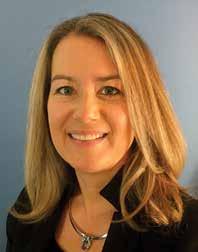
Fellow Patriots,
We—Mason’s amazing alumni—continue to impact communities, the country, and the world professionally and civically. Mason plays a foundational role in the process, and I am proud and motivated by the recognition Mason receives, including ranking top in the commonwealth for advancing social mobility for students and alumni (U.S. News & World Report, 2023).
Mason is more than just a place to learn. Our cutting-edge research and innovation, our commitments to peace, policy, and partnerships, and justice, diversity, and inclusion improve not just our campuses and the communities beyond them but everywhere Mason alumni live, work, and play.
As I pen this final Spirit message as your president of our Alumni Association, I have three final asks of you.
First, pay it forward and further key initiatives and priorities by contributing to the school or program that means the most to you on Mason Vision Day in April.
Second, stay connected. If you couldn’t attend Homecoming, we are coming to you! Join us at a Mason Nation Tour stop to meet Mason leadership and fellow alumni. There is no cost to attend, but please register in advance at alumni.gmu.edu/masontour24.
Third, spread Patriot Pride. Display your Mason connection on LinkedIn and other social media platforms, and amplify Mason messages and alumni doing great work with the hashtags #ispypatriotpride or #masonnationalumni.
Thank you for supporting Mason in your own unique way. Your involvement ensures that our university continues as a preeminent force in Northern Virginia, throughout the commonwealth and country, and around the world.
And finally, thank you for entrusting me with the leadership of the George Mason University Alumni Association for the past two years. It has been an honor and a privilege to represent you, and I will always treasure the memories and be proud of the progress we have made during my time as president. Although my tenure ends in June, I look forward to staying connected with you, fellow Patriots, brave and bold.
With Patriot Pride and appreciation,
Christine Landoll, BS ’89, MS ’92 President, George Mason University Alumni Association
Jennifer Furlong, BA Communication ’01, MA ’05, is communications director and analyst manager at Ad Fontes Media, where she oversees the organization’s internal and external communication strategy and implementation.
Lisa Underwood Kukla, MEd Curriculum and Instruction ’02, is director of correctional education in digital and lifelong learning at the University of North Carolina at Chapel Hill. The program serves hundreds of students annually through correspondence and on-site courses. She also teaches public policy in correctional facilities and notes that it is one of the best teaching experiences she has ever had.
Linda Plaisted, BIS ’02, won the Julia Margaret Cameron Award for Women Photographers in the segregation and human rights category for her series Ain’t I a Woman, created in response to learning of her ancestors’ slaveholding legacy. Her work will be shown at the Julia Margaret Cameron Awards 20th Gala Exhibition at FotoNostrum Gallery in Barcelona, Spain, in April and will be published in FotoNostrum magazine.
Rob Ryder, BA Communication ’02, is a member of the tenure-track faculty in the English department at Columbus State Community College in Columbus, Ohio, where he brings to his students the “passion he has for teaching and writing that he developed at Mason.”
Judy Pryor-Ramirez, BA Communication ’03, is clinical assistant professor of public services at New York University. She received the 2023 Professor of the Year Award from the Robert F. Wagner School of Public Service in her first year as a member of the full-time faculty.
Ashley Callen, JD ’04, is general counsel to the speaker of the U.S. House of Representatives Mike Johnson (R-LA). Callen’s professional career has been spent primarily on Capitol Hill, where she has served as general counsel to then House Republican Minority Leader Steve Scalise (R-LA) and deputy staff director of the House Oversight and Accountability Committee, among other roles. She started her career as a staff assistant to the late U.S. Senator Strom Thurmond (R-SC).
(continued on page 44)
BY EVAN CANTWELL

The journey of two brothers, from humble beginnings in their native Bangladesh to founding a billion-dollar company, is perhaps improbable—but in many ways it’s the ultimate validation of the possibility inherent to George Mason University.
Mason President Gregory Washington lauded brothers Maruf Ahmed, BS Electrical Engineering ’90, MS ’95, and Mahfuz Ahmed, BS Electrical Engineering ’93, at a special event in September 2023 for embodying the possibilities that Mason’s commitment to access and inclusion offers.
“It’s symbolic of what happens here at Mason,” Washington said at the event. “Where else in the region—not just the state—can two individuals from Bangladesh rise to the heights that they’ve achieved? Where else can that happen?”
Maruf is the current CEO of Dexian, a McLean, Virginiabased leading provider of staffing, IT, and workforce solutions with nearly 12,000 employees and 70 locations worldwide. Mahfuz preceded his brother as CEO and is now chairman of the board.
After donating $250,000 to the College of Engineering and Computing Dean’s Innovation Fund, the Ahmed brothers asked if Mason would be open to naming a trash can near Fenwick Library on their behalf. Mason officials agreed.
The trash can symbolizes the brothers’ journey from Bangladesh to Mason and how Mason was able to provide them with the knowledge and tools needed to start and build a billion-dollar company. While studying at Mason, Maruf worked as a groundskeeper for Facilities and cleaned the trash cans in front of Fenwick Library. It was among several jobs he took on to support himself while in school. He also worked in Ciao Hall—the dining hall formerly in The Hub—washing dishes and overseeing the dining area.
Mahfuz founded Dexian, formerly known as DISYS, in 1994. Maruf played an integral part in the strategy, launch, and development of the company and officially joined as partner and chief technology officer in 1999 as part of a merger with an IT staffing and consulting firm he cofounded in 1998. The brothers have since combined their vision and drive to build Dexian into a global enterprise.
Maruf credited his Mason experience as being “extremely influential” in making his and his brother’s success possible. “Mason means a lot to us,” he says. “This job that I had not only paid for the tuition that has allowed me to have the American dream, it also showed me the value of hard work, teamwork, and kindness.”
—John Hollis
Mahfuz Ahmed, Saima Ahmed, the brothers’ mother Shamim Mansur, Sonal Anjaria, and Maruf Ahmed at the dedication.
Are you an alum who owns a business?
List it in our alumniowned business directory.
Go to go.gmu.edu/ alumnibusiness to find out more.
Courtney Koestler, MA New Professional Studies ’05, is associate professor of education at Ohio University. She recently cowrote Early Elementary Mathematics Lessons to Explore, Understand, and Respond to Social Injustice, published by Corwin in August 2022. In addition, Koestler has been honored with several teaching awards by her peers and the Ohio Council of Teachers of Mathematics.
Michele Hayward, MS Biodefense ’06, is senior health care consultant at Medical Business Advisors (MBA), which recently was incorporated by BlueStone Services. MBA offers services such as revenue cycle management, performing practice valuations during selling or merging of a practice, managed care contracting analysis and negotiation, medical record chart audits,
Christine Landoll, BS ’89, MS ’92, President
Scott Hine, BS ’85, President-Elect
Darcy Kipp Kim, BS ’02, MPA ’20, Vice President, Alumni Engagement
Melissa Lewis, BA ’04, MA ’09, Vice President, Student Engagement
Janay Phillips, BA ’09, Vice President, Volunteerism
Ailsa Ware Burnett, BS ’93, MA ’96, MPA ’08, Vice President, Partnerships and Sponsorships
Cathy Lemmon, BA ’86, MA ’93, Historian Keith Callahan, BS ’86, Treasurer
Halleh Seyson, BS ’00, Director-at-Large (2022–24)
Kristen Taylor, BA ’88, Director-at-Large (2022–24)
Michael D. Marino, BA ’11, Director-at-Large (2023–24)
Chaimaa Fekkak, BA ’13, Director-at-Large (2023–25)
and coding analysis and training. She was featured in the article “BlueStone Services Assists Medical Practices Across the Country” on October 5, 2023, on I95business.com
Matthew Ryan Wilson, BA Psychology ’08, CERG Applied Behavior Analysis and MEd Special Education ’14, published The Big Six, a children’s book about a shift in thinking, communication, and perspective regarding diversity, as told through the narrative of a hippopotamus who wants to join a safari. Wilson is a licensed behavioral analyst who lives in Black Diamond, Washington.
Claire Forman Olson, BA Global Affairs and Latin American Studies ’09, MPA ’14, is an operations associate with the John Locke Foundation in Raleigh, North Carolina.
Kim Cone, BS Earth Science ’10, holds a doctoral degree from the Colorado School of Mines in Golden, Colorado. Her doctoral studies focused on the moon’s primitive solid structure as it cooled from its initially molten state. As a PhD student, she was awarded an IIE-GIRE Fellowship to study at the University of Oxford in 2021, and she also studied at the Florida Planets Lab at the University of Florida in 2020. Cone is a postdoctoral associate at the University of Rochester in New York, where she researches the effects of large planetary impacts on interpreting the moon’s early history.
Kate Maxwell, MS Systems Engineering ’10, is chief technology officer of worldwide defense and intelligence at Microsoft. Last year, she was ranked the No. 1 Woman in Technology by Technology magazine, in which she has also been profiled.
Brittney Pierce Mihalich, MA English ’11, is associate director of editorial content in the department of marketing and external affairs at Western New England University, where she also teaches English composition.
Alyse Knorr, MFA Creative Writing ’12, wrote her fourth collection of poetry, Ardor, which was published by Gasher Press in September 2023.
(continued on page 46)
Suehaila Nabulsi, BA ’00, Director-at-Large (2023–25)
Lisa Rosser, BA ’89, Director-at-Large (2023–25)
Deion Maith, BA ’20, President, Black Alumni Chapter
Charles Davidson, PhD ’16, President, Carter School for Peace and Conflict Resolution Alumni Chapter
Thomas Ammazzalorso, MA ’04, CERG ’05, MEd ’10, President, College of Education and Human Development Alumni Chapter
David P. Brown, PhD ’04, President, College of Engineering and Computing Alumni Chapter
Cheryl Rice, BA ’88, JD ’91, President, College of Humanities and Social Sciences Alumni Chapter
Kathi Huddleston, PhD ’08, President, College of Public Health Alumni Chapter
Mark Monson, BS ’74, President, College of Science Alumni Chapter
Vacant, President, College of Visual and Performing Arts Alumni Chapter
Pamela Maines, MBA ’09, President, Costello College Alumni Chapter
Laydy Reyes, BA ’08, President, Early Identification Program Alumni Chapter
Sawyer Dullaghan, BS ’15, President, Green Machine Ensembles Alumni Chapter
Melissa Alberto, BA ’19, President, Honors College Alumni Chapter
Xavier Clark, MPA ’18, PhD ’23, President, Lambda Alumni Chapter
Nely Garcia, BS ’21, President, Latino Alumni Chapter
Vacant, President, Scalia Law School Alumni Chapter
Brennan Georgianni, MPP ’16, President, Schar School of Policy and Government Alumni Chapter
Chris Jones, MA ’99, President, Veterans Alumni Chapter
If you would like to become involved in the Alumni Association, please contact the Office of Alumni Relations at alumni@gmu.edu.
When Susan Howard’s mother wanted to leave India for the United States in the 1950s, she had some negotiating to do.
“My grandparents were against it,” says Howard, PhD Environmental Science and Policy ’20, of her mom’s request, “but agreed on the condition that my mom be married. So, she compromised and said, ‘How about I get engaged?’”
That real-life scenario inspired Howard to create Go Nisha Go, an award-winning game that helps girls and young women in India navigate and negotiate life choices.
“We’re not trying to tell girls what is right or wrong. For some girls, listening to their parents is right for them,” says Howard, who teaches in Mason’s School of Integrative Studies. “Our aim with Nisha is to show players that their decisions matter.”
Launched in 2022, the game addresses public health concerns, such as nonconsensual sex, reproductive health, relationships, and contraception, and the cultural stigmas that are attached to them. More than a virtual experience, Go Nisha Go provides players with essential real-world resources that they can access directly from the game. It has 25 in-game partners, from social entrepreneurs to private-sector companies and small businesses. These partners provide menstrual hygiene products, as well as legal and crisis helplines for women who are being bullied or abused.
“The technology of embedding these links was challenging, but it was really worth it because we felt that it was our responsibility to bridge the in-game experience with real life,” Howard says.
It’s an example of work happening at Mason that tackles real-world challenges in ways that have a measurable impact—and it’s a model that’s working and garnering attention. With more than 250,000 players in India, the game was awarded Best Learning Game in 2023 by Games for Change and made the list of 10 honorable mentions in the social justice category of Fast Company’s Innovation by Design awards.
Go Nisha Go is an interdisciplinary effort. Mason PhD student Chih Hao “Andy” Huang handles the ingame analysis and data-security management, PhD student Patrick Baxter helped design the game’s

PHOTO PROVIDED
large-scale randomized control study that is being done among 1,900 girls, and alumna Jeannette Cachan, MPP ’15, is the knowledge management and monitoring advisor on the project. Mason Board of Visitors member and C2 Technologies CEO Dolly Oberoi has been a mentor to Howard throughout the game’s development.
“All design begins with people and understanding people,” says Howard. “At the end of the game, you get to see the outcome of all the choices you have made for your character and how in real life you can be inspired to be your ‘best self.’ ”
Go Nisha Go is available in India’s 11 Hindi-speaking states through Google Play. Howard is currently working on two additional games, including one for boys in India.
—Shayla Brown
Susan Howard posing with Nisha at a conference in Morocco where the game was showcased.
Ann Campbell, MS Peace Operations ’13, CERG
National Security and Public Policy ’16, served as governor of the Society of Mayflower Descendants for the District of Columbia from 2020 to 2022.
Tyler Olson, BS Accounting ’13, is assistant controller at Arcfield since June 2023. The company, based in Chantilly, Virginia, provides systems engineering and integration capabilities for the U.S. intelligence community, the Department of Defense, and other agencies.
Saad Manasterli, BIS ’14, MS Applied Information Technology ’16, published a book of poetry, A Reason to Look for Tomorrow, in January 2023 with New Degree Press. He is also a program manager at ICF, a global consulting and technology services company.
Char Manlove-Laws, MA Arts Management ’14, and Jestin Allen welcomed Malcolm William in May 2023.
Melissa Howard Tracy, MA Political Science ’16, is manager of data and strategy in the Division of Specialized Instruction at the District of Columbia Public Schools.
John “Jack” Knipe, PhD Education ’17, is assistant professor of education in the professional leadership program at Converse University in Spartanburg, South Carolina. Previously, he was assistant professor of English and Spanish at Limestone University in Gaffney, South Carolina, where he was also the international student support coordinator.
ALUMNI AND FRIENDS
Marjorie J. Kern, BA History ’69, d. September 9, 2023
Susan E. Blair, BA History ’70, d. August 7, 2023
Paul C. Gibert Jr., BA History ’71, d. July 17, 2023
Yvonne S. Scott, BS Business Analytics and Public Administration ’71, d. June 23, 2023
Stephen R. George, BA Economics ’72, d. August 25, 2023
Elizabeth L. Nelson, MEd Elementary Education ’72, d. September 1, 2023
Janet N. Sommerfeldt, MEd Elementary Education ’72, d. October 25, 2023
Thelma L. Spencer, BA English ’72, MEd Curriculum and Instruction ’75, d. October 23, 2023
Katie Kim, BSW ’18, was selected for the 2023–24 Minority Fellowship Program of the Council on Social Work Education, the accrediting organization for the field in the United States. Kim, a second-year doctoral student at Virginia Commonwealth University, is researching adverse childhood experiences stemming from parental alcohol misuse. The fellowship program supports research to improve health disparities around mental health and substance use and offers mentorship and networking opportunities that will facilitate collaborative research.
Katie Rose, BA Government and Politics ’18, was crowned the 70th Miss Virginia in July 2023. In addition to the title, Rose received a $20,000 scholarship and a spot in the Miss America pageant in January.
Victoria Morillo, MEd Curriculum and Instruction ’20, is a bilingual qualified mental health professional and a self-employed children’s therapist based in Ashburn, Virginia.
Nadirah Muhammad, BA English ’20, received the Women of Excellence Rising Professional Award from the Charlottesville (Virginia) Regional Chamber of Commerce. She is co-chair of the chamber’s Business Women’s Round Table. She also recently modeled for the Charlottesville boutique Darling x Dashing.
Carlos Vivaldi, BA Government and International Politics ’21, and Marjorie Rivas, BS Community Health ’20, are engaged to be married in August 2024.
Hilmara Donde, MS Operations Research ’23, is a research associate in the cost analysis and research division of the Institute for Defense Analyses’ Systems and Analyses Center.
Andrew Opitz, BA Film and Video Studies ’23, had his senior capstone film, Jazz, selected as a semi-finalist for the Student Academy Awards in the alternative/ experimental category. The Student Academy Awards is an international student film competition sponsored by the Academy of Motion Picture Arts and Sciences.
Marilyn J. Hodge, BSEd Early Education ’73, d. July 8, 2023
Gary A. Koehmstedt, BS Business Analytics ’74, d. October 8, 2023
Wayne Dill, BSEd Physical Education ’75, d. June 27, 2023
Nancy R. Scarborough, MEd Elementary Education ’75, PhD Education ’95, d. July 4, 2023
Anne T. Clarke, BA Sociology ’76, d. September 28, 2023
L. Jean Darby, BIS ’76, d. October 14, 2023
Mary P. DeButts, MEd Education Administration and Supervision ’76, d. September 29, 2023
Joan H. Hartley, MEd Special Education ’76, d. September 13, 2023
Cheryl L. Pleasant, BA Sociology ’76, d. November 25, 2023
Lilli M. Vincenz, MA Psychology ’76, d. June 27, 2023
Margaret B. Whitney, MEd Curriculum and Instruction ’76, d. September 23, 2023
Daniel E. Dunsmore, BA Government and Politics ’77, d. June 29, 2023
Eileen J. Henderson, BA Sociology ’77, d. August 25, 2023
Sandra S. Scruggs, BA Psychology ’77, MA ’82, d. June 22, 2023
John E. Bennett III, BSN ’78, d. July 27, 2023
Keith M. Dovenspike, MA Psychology ’78, d. October 20, 2023
Raimon W. Lehman Jr., BA Government and Politics ’78, d. September 19, 2023
Thomas P. O’Hare, MA History ’78, d. August 25, 2023
Mary Lou Stacey, BSN ’78, d. November 3, 2023
Elizabeth A. M. Diffie, BSEd Elementary Education ’79, d. July 20, 2023
Terry E. Hatfield, MBA ’79, d. October 7, 2023
Marye K. Rose, BS Business Administration ’79, d. August 15, 2023
Mark A. Macaron, JD ’80, d. October 4, 2023
James A. Sposito, JD ’80, d. July 7, 2023
Ronald D. Thomas, MBA ’80, d. August 8, 2023
Manning F. Tillman, BS Business Administration ’80, d. August 2, 2023
Mary J. Fizer, MEd Elementary Education ’81, d. June 30, 2023
Rob A. Brammer, MPA ’82, d. October 17, 2023
Halina D. Kulczycki, MSN ’82, d. September 6, 2023
Linda J. McElroy, BA Psychology ’82, d. November 3, 2023
Carolyn C. Pomponio, BIS ’82, d. November 19, 2023
Sheila B. Adams, BIS ’83, d. August 22, 2023
Constance M. Beck, BA Music ’84, d. August 20, 2023
Alan R. Gold, JD ’84, d. July 26, 2023
Stephanie V. Schank, MS Biology ’84, d. September 20, 2023
Helen M. Eaton, MA English ’85, CERG TESL ’85, d. January 8, 2023
Margaret A. Gahan, BSN ’85, d. August 8, 2023
Dolores D. Headlee, MEd Curriculum and Instruction ’85, d. September 22, 2023
Judith O. Berkey, MS Computer Science ’86, PhD Information Technology ’91, d. October 9, 2023
Irvin L. Muszynski, JD ’86, d. October 31, 2023
John D. Griffin, BS Accounting ’88, d. September 29, 2023
Ann H. Buckner, BS Accounting ’89, d. July 21, 2023
Kathryn P. Endicott, BSN ’89, MSN ’97, d. September 9, 2023
David A. Horne, JD ’89, d. August 21, 2023
Kelly S. Martin, BSEd Physical Education ’89, d. November 8, 2023
Deborah L. McDonald, MEd Curriculum and Instruction ’89, d. November 10, 2023
August J. Ryberg Jr., MS Systems Engineering ’89, d. May 26, 2023
Martha Wallis, BSN ’89, d. October 14, 2023
Gregory A. Wilt, MA Psychology ’90, PhD ’98, d. October 10, 2023
Doreen S. Zaccagnino, BA Psychology ’90, d. October 18, 2023
William W. Binzer, MS Operations Research and Management Science ’92, d. September 8, 2023
John W. Harned III, MS Information Systems ’92, d. September 1, 2023
John M. Koloshey, BA Economics ’92, d. October 31, 2023
Page Matthews, BA Government and Politics ’92, d. September 20, 2023
Joshua R. Ruddick, BA Philosophy ‘92, d. August 27, 2023
Rosemary Sales, BS Medical Technology ’92, d. July 29, 2023
W. Perry Epes, MFA ’93, d. July 11, 2023
Randolph P. Hinton, JD ’93, d. September 19, 2023
Donna L. Armani, BS Mathematics ’94, MEd Curriculum and Instruction ’98, d. August 3, 2023
Eileen M. Halvorsen, BS Accounting ’95, d. November 21, 2023
Eunice Murray, MEd Curriculum and Instruction ’95, d. September 13, 2023
Kraig K. Kelican, MEd Education Leadership ’96, d. September 21, 2023
Margaret J. Scolaro, MA Teaching English as Second Language ’96, d. August 16, 2023
Virginia A. Kubiak, MEd Curriculum and Instruction ’97, MEd Education Leadership ’00, d. October 9, 2023
Michelle A. Weltens, BA Psychology ’97, d. July 4, 2023
Robert A. Joyce, BS Business Administration ’99, MS Telecommunications ’08, CERG ’08, d. July 9, 2023
Pamela L. Egan, BIS ’00, d. October 2, 2023
Michael J. Hanrahan, MA New Professional Studies ’00, d. August 1, 2023
Ava A. Pippin, MA New Professional Studies ‘01, d. June 30, 2023
Andrew P. Burroughs, BS Management ’02, MBA ’05, d. September 7, 2023
Alberta Hill, BS Accounting ’04, d. August 29, 2023
Richard “Doc” Resnick, 72, passed away on July 12, 2023, after a brief illness. He was a dedicated podiatrist in the Burke community for 45 years and beloved sports physician at Mason. Resnick began caring for Mason student-athletes in 1979. For a time, he traveled with the men’s soccer and men’s basketball teams before dedicating his time to men’s soccer. He also spent time in the training room treating all Mason student-athletes. Resnick received his bachelor’s degree from the City College of New York and his postgraduate degree at the New York Medical School of Podiatric Medicine. He did his residency in sports medicine at Vasser Hospital in New York. In 2007, he was inducted into the Mason’s Men’s Soccer Hall of Fame for his service.
Ingrid Sandole-Staroste, BIS ’90, MA Sociology ’92, a longtime supporter of peace and conflict resolution studies at Mason, died November 14, 2023, of pancreatic cancer. She was 75. Born in Germany in the
James J. Abrams, MEd Special Education ’05, d. July 31, 2023
Cara M. Abbruscato, BS Psychology ’06, d. September 22, 2023
Matthew J. Mascari, BA Communication ’06, d. July 4, 2023
Matthew J. Azzato, BS Finance ’07, d. August 9, 2023
Leigh Hilton, BA Art History ’07, d. November 19, 2023
Kevin T. Moriarty, MS Geographic and Cartographic Sciences ’07, d. October 23, 2023
Rosanna L. Payne, BA Integrative Studies ’07, d. July 30, 2023
Victor L. Lee, BS Accounting ’09, MBA ’21, CERG ’21, d. November 9, 2023
William A. Graham, BS Management ’12, d. October 22, 2023
MaryElla W. Mohyla, MM ’12, MEd Education Leadership ’15, d. June 6, 2023
Erin M. Phillips, BS Community Health ‘14, BSN ‘15, d. October 18, 2023
Rebecca Scarborough, CERG Applied Behavior Analysis ’14, MSW ’16, d. July 2, 2023
Grace Fehan, BS Athletic Training ’18, d. July 20, 2022
Traci K. Selden, MEd Education Leadership ’18, d. November 14, 2023
Nicholas R. Hoy, CERG Business Administration ‘20, MBA ’23, d. September 10, 2023
Jimmy A. Chiou, MS Information Technology ‘23, d. November 1, 2023
Steven L. Bryson, d. July 9, 2023
John F. Byrne, d. August 31, 2023
Frank T. Csongos, d. September 4, 2023
Margaret R. Dear, d. July 19, 2023
Charles Genrich, d. October 31, 2023
Theresa C. Knauf, d. July 14, 2023
Patricia F. Lewis, d. October 20, 2023
Karen D. Secrist, d. October 17, 2023
John Stone, d. October 11, 2023
aftermath of World War II, she moved to the United States when her partner, Carter School founding faculty member Dennis Sandole, was offered a professorship at Mason in 1978. She earned two degrees from Mason and a PhD in sociology from the University of Virginia. She taught in Mason’s Sociology and Anthropology Department. The couple collaborated on two books: Handbook on Conflict Analysis and Resolution (Routledge, 2010) and Conflict Management and Problem Solving: Interpersonal to International Applications (1987). When Sandole was diagnosed with cancer, she became his devoted caregiver. Upon his death, she established the Dennis Sandole Memorial Scholarship in 2018 to honor his legacy and commitment to international students and the armed services. Sandole-Staroste is survived by a son, daughter-in-law, two grandchildren, and four siblings.

In the 1990s, Jenefir Isbister, a research professor in the Department of Molecular and Microbiology in George Mason University’s then College of Arts and Sciences, was asked if it were possible to develop a quick, portable, and accurate tool to detect pathogens in liquids. Her invention of a test for microbial contamination resulted in Mason’s first patent. The paperwork for “Biological assay for microbial contamination” was filed on May 27, 1994, with the patent awarded on August 27, 1996.
Isbister, now retired from Mason and Professor Emerita of Molecular and Microbiology, followed up with additional research that led to a second patent in 1999 and the development of commercially produced biological test kits for total viable bacteria, coliforms, and Escherichia coli . Maryland-based IME Inc. manufactured and marketed the test kit for total viable bacteria, known as Kool Kount Assayer.
Isbister’s work is part of Mason’s history of unique research and innovation that results in discoveries with real-world applications. In 2023, the National Academy of Inventors ranked Mason No. 91 in its list of the top 100 universities granted patents during 2022.
In April 2023, George Mason University launched Mason Now: Power the Possible, a one-billion-dollar comprehensive campaign to support student success, research, innovation, community, and stewardship. And as with all things Mason, this campaign is about— and will depend on—our distinctive Mason community.
At Mason, we are All Together Different. And what makes us different is not just who we are or what we do, but what we believe. We believe that present progress matters more than past pedigree. That talent needs opportunity, not permission. That the future is something we create, not something that happens to us. That when all voices are invited to shape what’s next, the future is closer than you think, and what’s possible is transformed into what is.
The Mason Now campaign is ambitious. It’s audacious. It will require determination and grit. That’s what makes it Mason.
Support Mason Now gmu.edu/masonnow

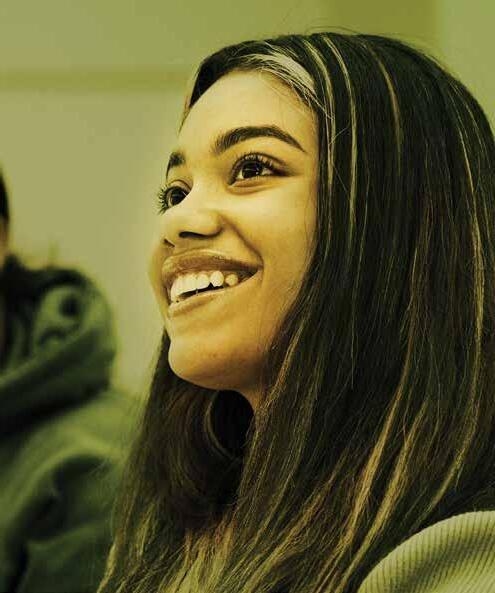
@georgemason
@georgemasonu
@georgemasonuniversity
@georgemasonu
CELEBRATING DIGITAL INNOVATION—In November, Mason and Arlington community members gathered at Fuse at Mason Square to celebrate the building’s topping out and hear from students who demonstrated the kinds of research that will take place there.
